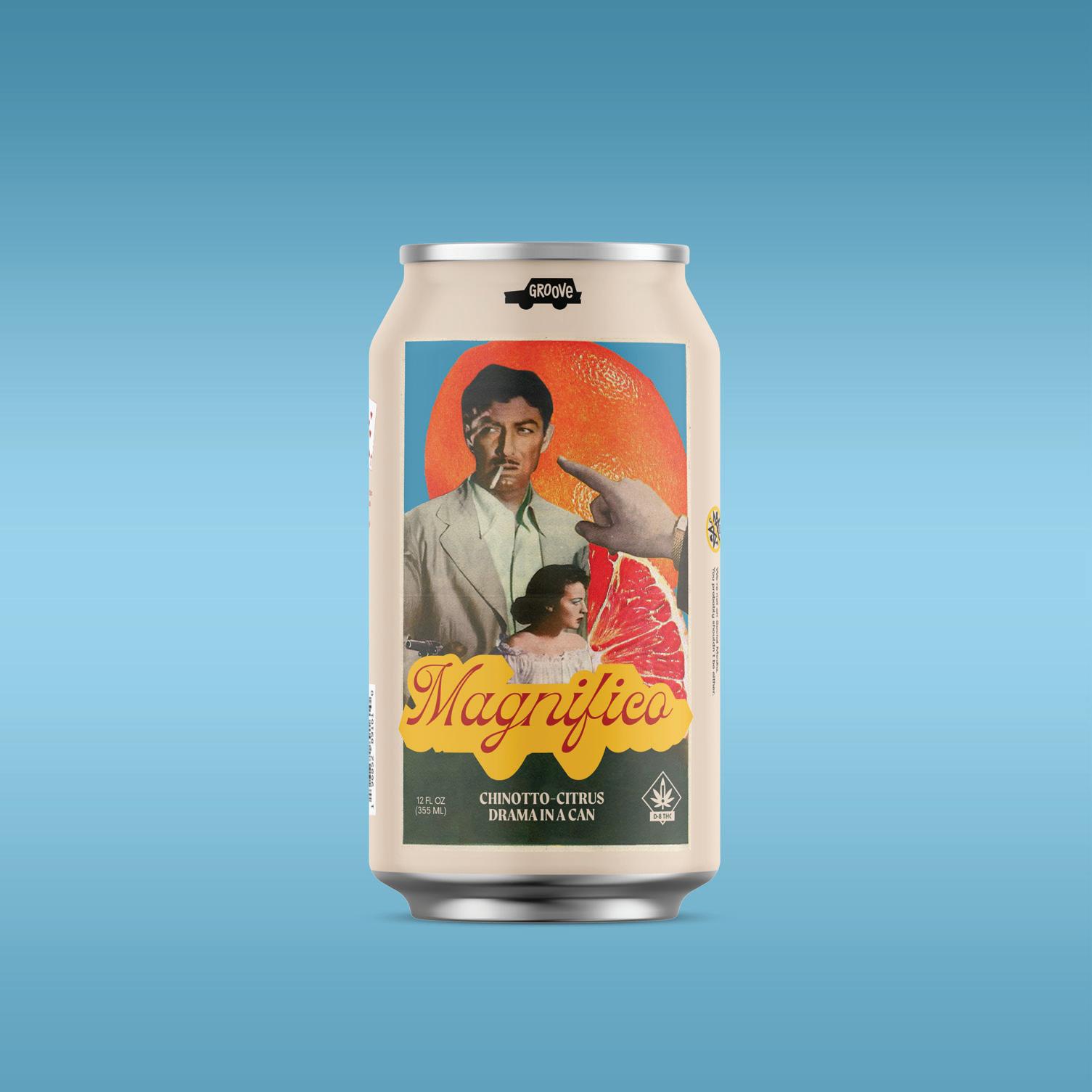






































































VOL. 40 NO. 27
6 A new program in Durham Public Schools teaches students how to build wealth through investing. BY MIKE
MACMILLAN8 An ode to old-school Durham supply store Not Just Paper. BY LENA
10 Two Wake County students are on a mission to make sure girls in the Triangle can access period products in their schools. BY
GELLER JASMINE GALLUP14 Part Two in our series on Durham's upcoming municipal election: a look at crime and policing in the Bull City. BY
MATT HARTMAN18 A new Durham exhibition looks at recent history through the eyes of teenagers. BY HANNAH
KAUFMAN21 At this year's Hopscotch, small clubs are back—and so is the chance for local acts to play shoulder-to-shoulder with music legends.
 BY JORDAN LAWRENCE
BY JORDAN LAWRENCE
23 From Lesthegenius to Cro-Mags: Our picks for this year's Hopscotch Music Festival. BY
JORDAN LAWRENCE24 Celebrating hip-hop's 50th birthday with reflections from Phonte, Khyrsis, Rapper Big Pooh, Jozeemo, and more. BY KYESHA
JENNINGS3 Backtalk | 15 Minutes
5 Voices 30 Culture calendar
CORRECTION Our 40 Year Photo Retrospective used the incorrect credit byline for a former INDY staff photographer. The correct byline is D.L. Anderson.
COVER Photo collage images via Unsplash and Pexels.
PUBLISHER
John Hurld
EDITORIAL
Editor in Chief
Jane Porter
Culture Editor
Sarah Edwards
Staff Writers
Jasmine Gallup
Lena Geller
Contributors
Spencer Griffith, Carr Harkrader, Matt Hartman, Brian Howe, Kyesha Jennings, Jordan Lawrence, Glenn McDonald, Thomasi
McDonald, Nick McGregor, Gabi Mendick, Shelbi Polk, Dan Ruccia, Harris Wheless, Byron Woods, Barry Yeoman
Copy Editor
Iza Wojciechowska
23, 2023 INDYweek.com
Interns
Mariana Fabian, Hannah
Kaufman, Iris Miller
CREATIVE
Creative Director
Nicole Pajor Moore
Graphic Designer
Izzel Flores
Staff Photographer Brett Villena
ADVERTISING
Publisher John Hurld
Director of Revenue
Mathias Marchington
CIRCULATION
Berry Media Group
MEMBERSHIP/ SUBSCRIPTIONS
John Hurld
INDY Week | indyweek.com
P.O. Box 1772 • Durham, N.C. 27702 919-666-7229
EMAIL ADDRESSES
first initial[no space]last name@indyweek.com
C K T A L
B A
Can we please have Mayor William Bell back to resume Durhams’ path to excellence?
Perhaps some public citizen speaker should hold a large picture of Mayor Bell up and show it to the current administration.
They could remind these officials that Mayor Bell put Durham solidly on the path it has taken to this point.
And they could further admonish them that the shameful pettiness of personal politics is taking Durham in exactly the opposite direction.
One of the administration stated that it was up to the voters to hold other officials accountable. Unfortunately it won’t work that way.
The voters will not be aware of the intimate details of the animosity of petty conflict extant in Durham City government.
It would be better if those putting their own interests above those of the City of Durham would take the lesson of the Mayor Bell story and hold *themselves* accountable—resign, if they can’t clean up their act.
I was confused about the August 9th cover page and editorial Chaos in the Bullring. When I watch the recordings of City Council meetings on YouTube, I am always impressed with Mayor O’Neal’s calm voice, emphasis on respect and values, and her warm treatment of persons who come to speak. The article quoted James Chavis correctly about people treated with disrespect, but it seemed to deflect to all of Council when Mr. Chavis specifically mentioned Mr. Williams. In fairness, I appreciate that this was written as an opinion piece. Even so, the editorial’s references to the mayor as a “stern parent” and Dr. Holsey-Hyman as “almost in tears” places an emotional veil that undermines the calm, thoughtful discussions of important items including the budget issue when Mayor O’Neal, and Council members Freeman and Holsey-Hymen were the only ones to vote for raises for first responders whose low pay is causing understaffing.
Be sure to check out the second installment in Hartman’s series that takes a look at the impact of crime and policing in Durham—and how those issues could affect the upcoming election—on page 14 of our paper this week.
Girl Scout who created a butterfly garden for Magnolia Glen, a senior living community in North Raleigh
 BY HANNAH KAUFMAN backtalk@indyweek.com
BY HANNAH KAUFMAN backtalk@indyweek.com
Can you tell me about how you first encountered Magnolia Glen?
I’ve been going to Magnolia Glen since I was younger, since that’s where my mom has worked for a while now. So I started to get to know all of the [residents] there, and I just fell in love with Magnolia Glen.
How did you decide to make the butterfly garden?
I basically just looked through a list of different ideas, and I talked with one of the workers at Magnolia Glen to see what she thought would fit best. We picked out the butterfly garden just to make the space have more color. I thought they could use this butterfly garden more than really anyone else could.
Can you describe the garden?
I made a butterfly-shaped garden with three or four different types of flowers, some of which are coneflowers, rubinas, black and blue sage, and purple flowers. Then they patched up around it and put more grass around it, too.
What do you think the garden has brought to the Magnolia Glen community?
I think it’s a space for more of the residents to sit outside and see different wildlife that’s coming around the garden. It gives them something else to enjoy for years to come and things they can look at.
Why’d you join your Girl Scouts troop?
I was one of the first members out of three. I wanted to join Scouts since my brother was in Scouts and Cub Scouts and I did activities with his troop for a while, so I found out that the troop I’m currently in was forming a girl’s troop.
Will you keep doing work like this in the future?
With the garden I’ve already made at Magnolia Glen, I’ll definitely come back, and I’m thinking of adding more flowers to it of different types as well. W
This Q&A has been edited for length and clarity.
And from reader SUSAN W., also via email:



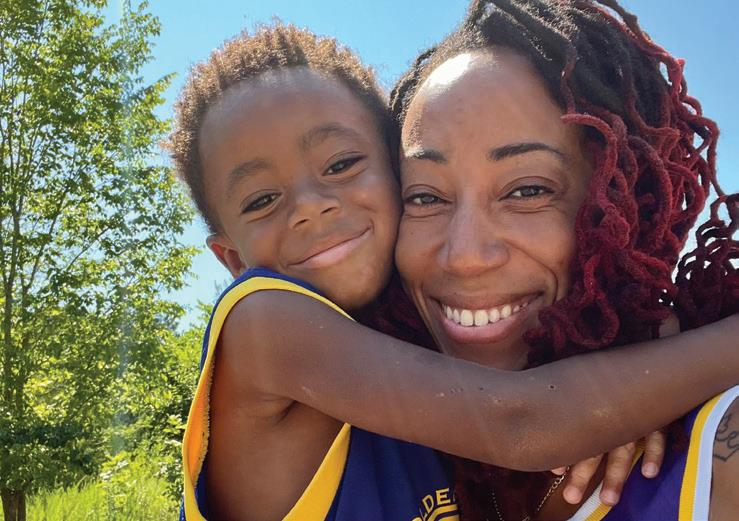 BY DESMERA GATEWOOD backtalk@indyweek.com
BY DESMERA GATEWOOD backtalk@indyweek.com
Black people have a superpower, a healing agent that weaves between a sedative and a stimulant, recalibrating resilience and reviving resistance. It’s the spirit of Black Joy.
In August 2015, that Black Joy superpower activated a league of Black Durham millennials— Derrick Beasley, Ja’Nell Henry, Moses Ochola, Joshua Gunn, and Crystal Taylor—to gift Durham’s Black community with the realization of a historic grassroots cookout: Black August in the Park (BAP), also known these days as “Black August.” This celebration recognizes the significance of the month of August and its historical relevance to Black resistance.
One member of the league, Crystal Taylor, saw her powers intensify as she evolved from an ambitious cultural curator to a seemingly supernatural single mother. Like the Black matriarchs present throughout her upbringing, Taylor balances the sorrow of raising a Black child in an antiBlack society with the pride of existing within an impenetrably hopeful community of Black people. She believes that pain is not a barrier for joy; it’s an invitation for joy’s curation. She subscribes to the belief that weeping may endure for a night, but joy cometh in the morning.
Taylor’s motherhood-inspired, maternal approach to collectivism is critical to Black August’s continued impact. As the only mother and single parent of the group, Taylor is the quintessential Black Mama of Black August.
Throughout the diaspora, the 2010s represented a reprise of grim Jim Crow–esque imagery—the audio of Black children pleading in anguish for help; videos of Black people begging for mercy moments before death; depictions of lifeless victims
who were once lively fathers, daughters, and cousins. The year 2015 was the culmination in a series of years of senseless killings of Black people. Speaking the names of the slain, erecting altars, holding space, mass protesting, vigils, civil disobedience, prayers, marches, coalitions, lobbies—that year, we fought back with everything we had. And all of that fighting takes a toll on the body and spirit. All of that trauma takes a toll on stability. All of that grief takes a toll on hope.
But Black people have healers to ease some of that toll. They are the curators of Black Joy.
Curators of Black Joy have a calling to reincarnate the passionate grief of an oppressed community into a celebration of the resilience of a triumphant people. For Taylor, co-leading participation in Durham’s Black August in the Park, the Beats and Bars Music Festival, and the Black Farmers Market demonstrates her dedication to delivering the healing and fun that commences Black Joy.
In 2012, Taylor founded the Underground Collective hip-hop platform, a space for artists and creatives to build community and circulate their projects. Three years later, together with the leadership of her colleagues Beasley, Ochola, Gunn, and Henry, Taylor co-initiated Durham’s Black August in the Park. The group would go on to create Durham’s Black Market the same year, which would evolve into the Black Farmers Market. Following the momentum, Taylor also birthed the Beats and Bars festival, collaborating in 2016 alongside artists and content creators John Laww, Kyesha Jennings, Toon, and Donald Salmon Jr., to host the inaugural festival lineup at Durham’s Pinhook.
In June 2018, Taylor gave birth to her son Mansa. This same year, Taylor pulled me in to co-emcee and co-facilitate the Black August Bondference, the kickoff event for Durham’s 2018 Black August in the Park. Just two months after giving birth, Taylor was juggling microphones and baby bottles for Bondference, managing the run of show in between the unpredictable demands of caring for an eightweek-old infant.
I watched reminiscently, remembering my own days of multitasking through early parenting, as Taylor masterfully intersected her dedication to brotherhood with her commitment to motherhood.
Since 2015’s inaugural Black August in the Park, Durham has witnessed what’s possible when a village protects and nurtures a child like Mansa so a mama like Taylor can lay building blocks.
Part picnic, cookout, block party, and family reunion, Black August in the Park epitomizes what is possible when the Black Joy superpower is channeled with intentional love. Like a multitude of mothers in the movement, Taylor’s success is as contingent on her community’s dedication as it is on hers. I’ve watched as she passed Mansa to the next willing arms so she could address a room full of planning meeting attendees. I’ve observed Taylor’s mother, Dr. Carolyn Rose Taylor, relieve her and soothe an unsettled Mansa, granting Taylor a small window of freedom to contribute to a program in progress. I’ve laughed along with others who extend-
ed compassion and solidarity when Mansa would crawl on top of her and close the laptop or end the call. These gestures of love and patience help remove the barriers that restrict mothers from realizing their passion without neglecting their families.
While Taylor holds a résumé of successful community productions, she herself is also a successful product of community. These communities include her alma mater, NC Central University, where she’s recognized in the 2023 cohort of 40 alumni under 40. These communities include the Black Farmers Market and its members, who show gratitude for the opportunity to sell their goods. These communities include single mothers and Black women who give food, childcare, and relief to other working mothers.
It takes a village to raise a child, and it takes a village to sustain an adult. The continuity and preservation of the village is tantamount to curating that healing agent of Black Joy. That preservation is what kept Taylor dedicated to Black August, through the uncertainty of a pandemic and the transitions of some of its founding members.
Since 2021, Taylor has continued her ministry through her own nonprofit, Get Happy. It’s a fitting name for an organization pioneered by a prominent activator of Black Joy.
This year, you can catch Mansa and his village celebrating in the park at the joyful occasion cofounded by his mama, the Black Mama of Black August, the phenomenal Crystal Taylor. W
A new program in Durham Public Schools aims to teach students about investing.
BY MIKE MACMILLAN backtalk@indyweek.com“Some of the students thought it was just a scam,” says Shianyisimi Ogede, a 10th-grade social studies teacher at Hillside High School in Durham.
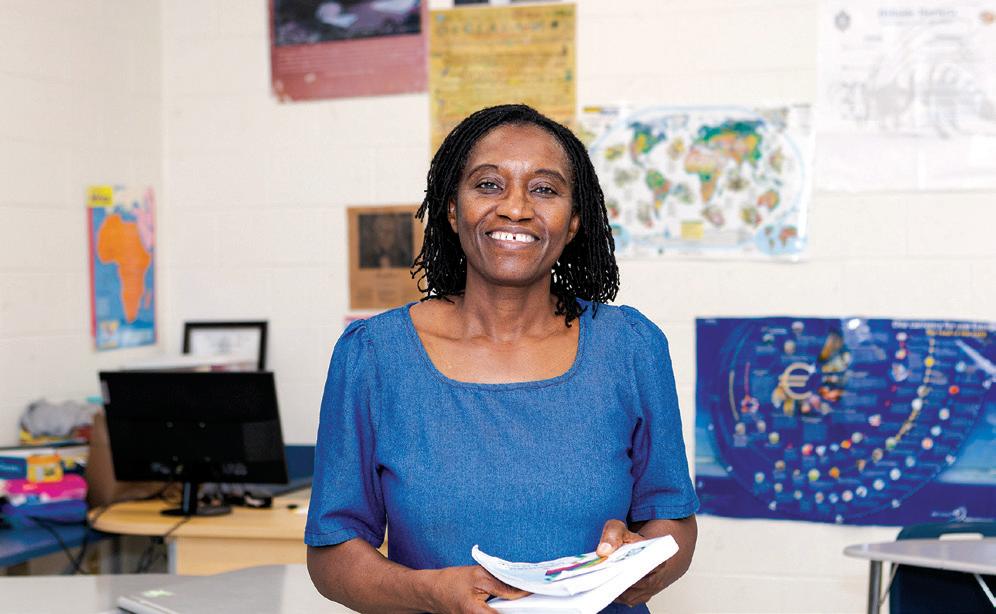
She’s referring to her students’ initial reaction to a new curriculum on investing and the stock market that was introduced in her class in the fall of 2022. The program is offered to mostly low-income Title I schools through a nonprofit called First Generation Investors (FGI), the brainchild of a group of undergraduate students at the University of Pennsylvania who founded the organization in 2018. Volunteer undergraduates from local universities, from Duke in the case of the Durham Public Schools, teach the course. It made its debut in Durham, via Zoom, in the fall of 2021.
The kicker: in addition to an introduction to how markets work, students receive $100 in real money to invest, money they get to keep when they finish the program, graduate from high school, and turn 18 years old.
Some level of skepticism is not uncommon at the beginning, says Niso Nahmiyas, the Duke student who leads the
local program. A rising senior, he is the child of immigrants (his father is from Turkey, his mother Colombia).
“With some of the students there’s the attitude that ‘What, you’re here to save me and you’re going to do it with 100 bucks?’”
But, he says, that negativity quickly dissipates once the classes start.
Ogede agrees. The students see that “it [the stock market] is not just for rich people. It’s not an exclusive club. It’s something they can do,” she says.
The curriculum begins with the basics: What is a stock? How do markets work?
It goes on to cover the benefits of diversification (owning a range of assets or a broad-based mutual fund, for example), volatility (the market’s ups and downs), and dol-
lar-cost averaging (investing regularly to even out the price paid for a stock, bond, or mutual fund), among other topics. It includes sections on bonds as well as stocks and on exchange-traded funds, a type of pooled investment like a mutual fund. It ends with a requirement that students research and assemble their own hypothetical portfolios.
“It’s called First Generation Investors because most of these kids’ parents haven’t had the chance to learn what they’re learning,” says Nahmiyas. “The goal is to stop the cycle of some people working hard and investing and others working just as hard but never having the opportunity to accumulate wealth.”
Decades of study and untold amounts of hand-wringing have so far done little to address the issue of wealth inequality in the United States. There is all kinds of data to support this, but maybe the most compelling number is that, as of the end of 2022, the top 10 percent of U.S. households had 68 percent of total household wealth, most of that concentrated in the hands of the top 1 or 2 percent, while the bottom 50 percent had just 3 percent of the total household wealth, according to the St. Louis Federal Reserve.
In his latest book, Poverty, by America, Pulitzer Prize–winning author Matthew Desmond writes that over the last 50 years the poverty rate in the United States has barely budged, falling from 12 percent in 1970 to 11 percent in 2019.
Whatever your politics, this lack of progress is alarming. To fix this, those on the left might cite a need for higher taxes; more programs to address shortcomings in education, housing, and health care; and a greater redistribution of wealth generally. Those on the right will point to the hundreds of billions of dollars that have been spent over that period to apparently little effect.
Given the seeming intractability of the problem, why not try something different?
If its rapid growth is any indication, FGI does appear to be fulfilling a need. From a single high school in Philadelphia the program has expanded to 63 schools around the country, including three in Durham in the latest spring semester. There were 530 program graduates through the spring of this year, according to FGI. In addition to Duke, participating colleges include Atlanta’s Spelman and Morehouse Colleges, Harvard, Dartmouth, Yale, the University of
Southern California, and UNC-Chapel Hill, among many others.
In Durham, the first FGI classes were held during the COVID year of 2021 and offered exclusively over Zoom. There was no requirement to participate—students had to opt in. The inaugural program had 20 participants from Hillside High School and 12 from Jordan High School.
As COVID became less of a worry and students returned to class, this ad hoc approach gave way to something more systematic. This was due in part to legislation that the state passed in 2019 that required all high school students to complete a course in economics and personal finance (EPF), beginning with the graduating class of 2024. Most personal finance courses tend to focus on topics like credit cards, car loans, and mortgages and other forms of borrowing, with only cursory attention paid to the stock market and investing. The FGI program provided the opportunity to remedy that with a ready-made eight-week curriculum that could be quickly introduced into the classroom.
Following her experience with FGI, Ogede reached out to Charlene Martin-Klein, a social studies curriculum specialist for grades K–12.
“She [Ogede] saw how our students were responding to the Duke volunteers and their passion [for the subject matter] and the power of these near-peer interactions,” Martin-Klein says. “We thought it would be a great resource.”
Bella Mitchell, a rising senior at Riverside High School, was one of the school’s first
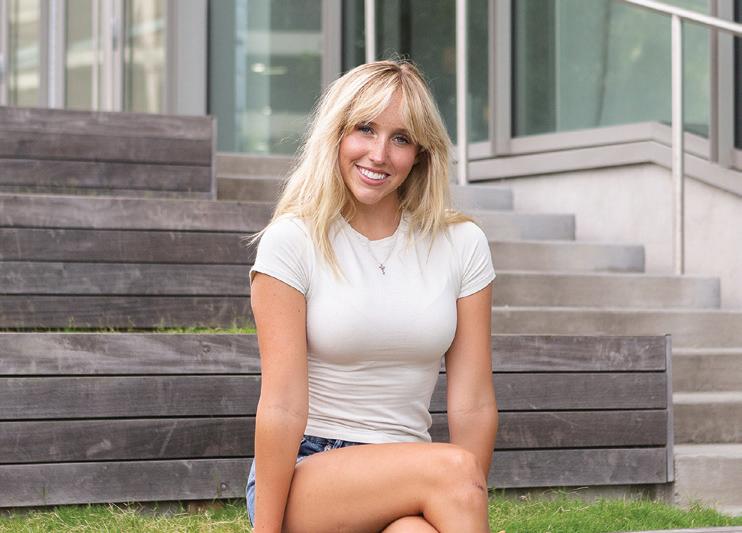
students to participate in an EPF class, in the fall of 2022. Typical among FGI participants, she had little exposure to investing or the markets prior to the class. “It was one of the first classes I thought would have importance in the outside world,” she says. “One hundred percent, everyone should be exposed to this.”
Here as elsewhere, the concept that tends to get everyone’s attention is compounding—the idea that a small amount of money invested now can grow into something more substantial over time.
“At their age [18 years old or younger], an investment of $1 compounding at 10 percent a year over 47 years will be worth $88 when they turn 65,” says David Norman, who chairs the social studies department at Riverside and has helped pilot the EPF program. A former stockbroker, Norman is a big supporter of financial education and holds an annual workshop on financial fitness for his fellow Durham Public Schools instructors.
No matter whether they’re going off to an Ivy League college or entering the workforce after high school, “they all need this information [about the markets],” Norman says. “The kids on the lower end of the socioeconomic spectrum, those working at Bojangles 30 hours a week, they’re the ones who are eager to find out how this money stuff works.”
While the $100 provided to graduates won’t on its own make anyone rich, it does bring a tangibility to what would otherwise be an abstract exercise. “They know $100 is not a tremendous amount of money, but it makes it more real,” says Martin-Klein.
“And they will have access to it when they graduate.”
Mitchell agrees.
“Getting the $100 to invest was really fun,” she says.
Over the past few decades trends in technology have made it simpler and cheaper to save and invest.
There are, for example, multiple microsavings apps like Acorns, Stash, and Qapital that allow individuals to automatically set aside small amounts of money that they can use to buy shares in a stock
of graduates is still small. And, of course, investing is not without risk; markets go down as well as up.
But Durham, at least, has seen enough to continue moving ahead. While the FGI program is not yet a district-wide mandate, the hope is to expand it to reach around 250 students a semester in the 2023–24 school year across the 9th through 12th grades, according to Martin-Klein. About 172 students have been through the program so far.
“It’s really important they are giving students a chance to do this authentically rather than through a simulation,” says Martin-Klein. “We hope that seeing their portfolios grow will create a lifelong habit of saving and investing.”
While many agree that the lack of progress in closing the wealth gap in the United States is discouraging—destabilizing from a social standpoint and without a uniform solution—programs like FGI can be “one piece of the puzzle,” in Norman’s view.
As with anything, there’s room for improvement. Norman cites an overemphasis on “buy low, sell high,” always easier said than done. Mitchell, the Riverside student, adds that “it would be cool to see some diversity in that program [among the FGI tutors]. Everyone’s experience is going to be different.”
Nonetheless, Norman says, “it’s a hopeful message.”
or mutual fund. The ability to buy what are known as “fractional shares,” essentially a part of a share, dramatically lowers the price of entry (you can by onethird of a share of a $300 exchange-traded fund for $100, for example). But for many lower-income families, the markets remain a mystery. While about 60 percent of adult Americans owned stock as of mid2023, those in the bottom 50th percentile owned just 0.6 percent of the shares, according to Gallup. The top 1 percent held more than half. The rich get richer.
“Across three of my classes I can count on one hand the number of kids who have a clue about any of this,” says Norman. “Wealth inequality is education inequality, too.”
In his EPF course, Norman quickly cuts to the chase.
“I start with the money,” he says. “I tell them the great equalizer is that money is not black. It’s not white. It’s green. It’s a tool. The question is, if the game is ‘rigged,’ how do you play the game? How do you make your money work for you?”
Nationally and in the Durham school system, the FGI program is still in its infancy. While the data so far is encouraging, it is far from conclusive. The sample size
FGI is not the only organization working to introduce economically underserved Durham residents to the concept of financial literacy. MaKayla Booker, a Durham native who splits her time between here and Atlanta, founded Wall Street Juniors in 2018 to do something similar on a grassroots level. The group focuses on building wealth and fostering entrepreneurship as a way to address intergenerational inequities, holding classes in locations around the city including at Seed Garden and the Cornwallis community neighborhood.
But regardless of who is doing the teaching, providing students with an understanding of the time value of money is critical. As Ogede says about the FGI program, “Putting money to work in the 10th grade gives it that much longer to grow.”
This should be helpful, she says, “when it comes to closing the income inequality gap, a social justice kind of thing. It’s an awesome opportunity for the kids.
“It would be good if every student is given the opportunity to invest before they leave high school.” W
“I start with the money. The great equalizer is that money is not black. It’s not white. It’s green.”
As a local supply company celebrates 100 years, its old-school Durham retail store continues doing what it does best: Evolving to meet the needs of the community.
BY LENA GELLER lgeller@indyweek.comIn August 2018, as the dog days of summer waned into a stretch without holidays, a supply store in downtown Durham found something to celebrate: National Toilet Paper Day.
“It is one of those things we sometimes take for granted, until we can’t find any,” the store wrote in a Facebook post. “Next time you’re running low, stop by.”
Indeed, two years later, at the height of 2020’s toilet paper panic, the store, Not Just Paper, was the only place in town with the goods.
Not Just Paper’s reliable TP supply came from Brame, its Durham-based parent company. During the first few months of the pandemic, Brame—which has six distribution sites in North Carolina and Virginia but only one retail location, Not Just Paper—benefited from a near century’s worth of connections: its founder, R.L. Brame, started building relationships with area paper mills in the 1920s. The company, which is still helmed by the Brame family, turns 100 this year.
True to its name, though, Not Just Paper, which sells a myriad of school, office, food service, and cleaning materials, had more than just toilet paper in its inventory of early pandemic essentials.
Some items were already on the shelves—namely, things like whiteboards, spelling games, and gold star stickers— and others were stocked up per request.
“You had parents and grandparents all over the place who wanted school desks,” says David Matthews, a Brame branch manager who oversees Not Just Paper. “So we started selling desks.”
Per pleas from local restaurant owners, the store also
began supplying a wider variety of to-go packaging. (It still has a surplus of takeout boxes that say “Best Chicken,” which one non-chicken-oriented purveyor requested for dimensional reasons and gladly purchased while options were limited.)
According to Brame lore, R.L. Brame named the company as such because “first, it was his name; and second, he wasn’t sure what other products the company would eventually offer to meet his customers’ needs.”
At the also-nebulously-named Not Just Paper, the latter point has remained a tenet of the model: community needs drive product changes. Those needs, like upping toilet paper counts, are sometimes broad. But many are neighborhood related or individual—and they aren’t typically crisis-induced.
During its first decade in business, Not Just Paper, which was founded in 1989, mostly stuck to school supplies, Matthews tells me. We’re sitting with his assistant, Carissa Starks, in an office that straddles the store’s two sections. The front of the store, which Starks helms, is largely stocked with educational materials; the back, Matthews’s turf, opens into a 60,000-square-foot warehouse.
Matthews joined the Not Just Paper staff 15 years ago, around the time the downtown Durham restaurant scene was heating up. Budding food businesses needed a place to buy things like packaging and piping tips in small quantities, so the store began stocking them.
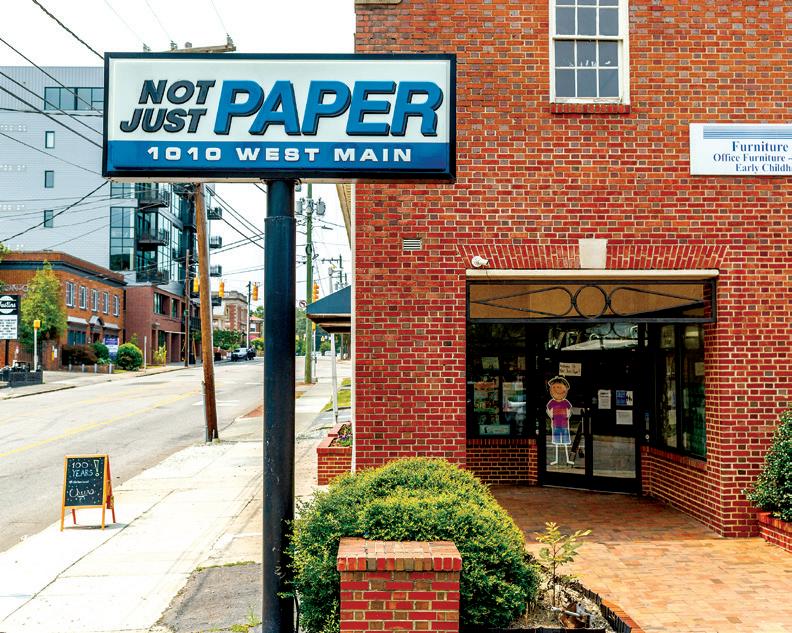
Then people started asking for party supplies. There wasn’t a party store within a 10-mile radius of downtown. Staff outfitted the front section of the store with balloons, streamers, and birthday banners.
Both Matthews and Starks came to Not Just Paper after working positions at Walmart. They’re a lot happier here, they say, and I believe it. They frequently talk over each other, racing to relay the same colorful tidbits: Have I heard about Brame’s cameo in the movie Bull Durham, where the company’s name can be seen plastered on a prominent ball-field billboard? Do I know about the store’s sea turtle mascot?
When I ask them if the store has competition, they say “Amazon” unanimously, and when I ask for their thoughts on the state of things for small businesses in a post-pandemic Durham, Starks mentions that the owner of a nearby business sometimes stops by so they can “cry together.”
Not Just Paper is old-school. The day before our conversation, Matthews says, a Not Just Paper sales associate was riding around town with a car full of educational supplies, showcasing products door-to-door at schools.
The store doesn’t have its own website, so, in Starks’s words, “no one really knows what’s in here.”
Still, there’s value in hands-on, community-oriented customer service, she notes. Last weekend, for instance, Not Just Paper hosted its back-to-school teacher bash, an annual event that offers area educators a 20 percent discount on everything in the store.
Also, the internet doesn’t stock everything
As a teenager, like R.L. Brame, I started a business and named it after myself. Unlike R.L. Brame, I did not have the foresight to keep branding vague, and so it remained “Lena’s Lunchbox” after I went on to sell cakes, not lunch food. All of my cakes were packaged in pink pastry boxes I bought at Not Just Paper. The boxes cost around 30¢ each
and came in every size imaginable.
When I moved to Washington, D.C., for college, I couldn’t find a single place to buy those cake boxes, either in person or online, in quantities under 100. So I returned to Not Just Paper, transporting them back on my lap during MegaBus trips.
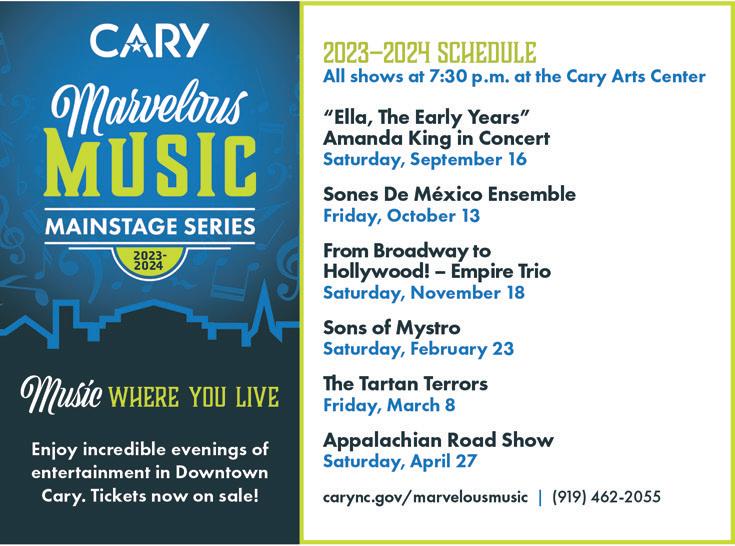
There are things we sometimes take for granted until we can’t find them: toilet paper, cake boxes, stores like Not Just Paper.
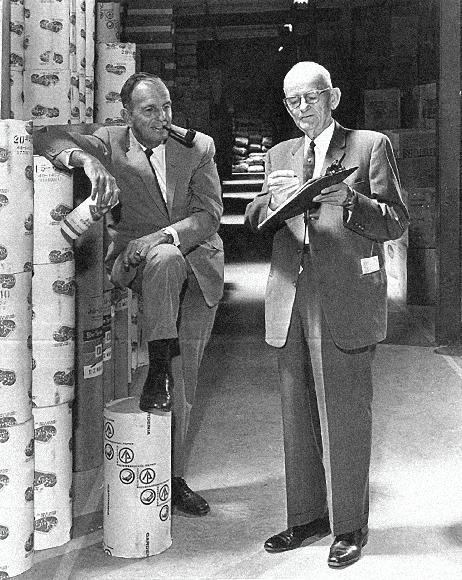
During my conversation with Matthews and Starks, I learned that Not Just Paper began stocking pink pastry boxes 15 years ago at the behest of a single customer, LeAne Boksleitner, who was in the early stages of her own home baking business

“I would meet her about halfway between here and Wake Forest so she wouldn’t have to drive so far,” Matthews says. “People probably thought we were doing a drug deal—I was handing her boxes, she would give me money. She got like $20 of stuff per week.”

Now, Matthews says, Boksleitner has a brick-and-mortar bakery on Capitol Boulevard “with probably as many employees as we’ve got.”
“You got to see the whole transformation,” I say.
“You asked me why I’m here,” he says. “That’s why.” W
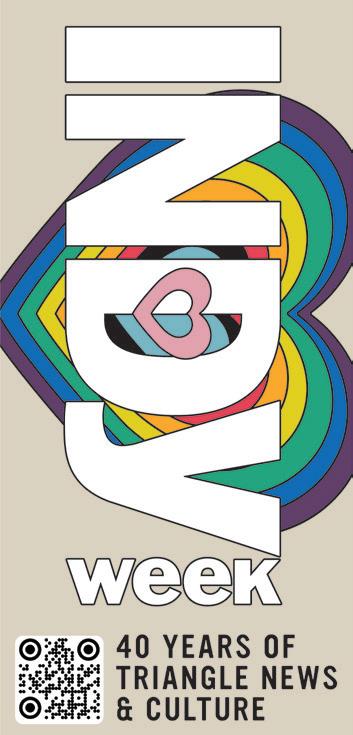
Two Wake County students are on a mission to make sure girls in the Triangle are able to access period products at their schools.
BY JASMINE GALLUP jgallup@indyweek.comFarah Rosaleen and Sarah Pazokian, both 17-year-old rising seniors at Green Hope High School in Wake County, want to take the taboo out of tampons and pads.
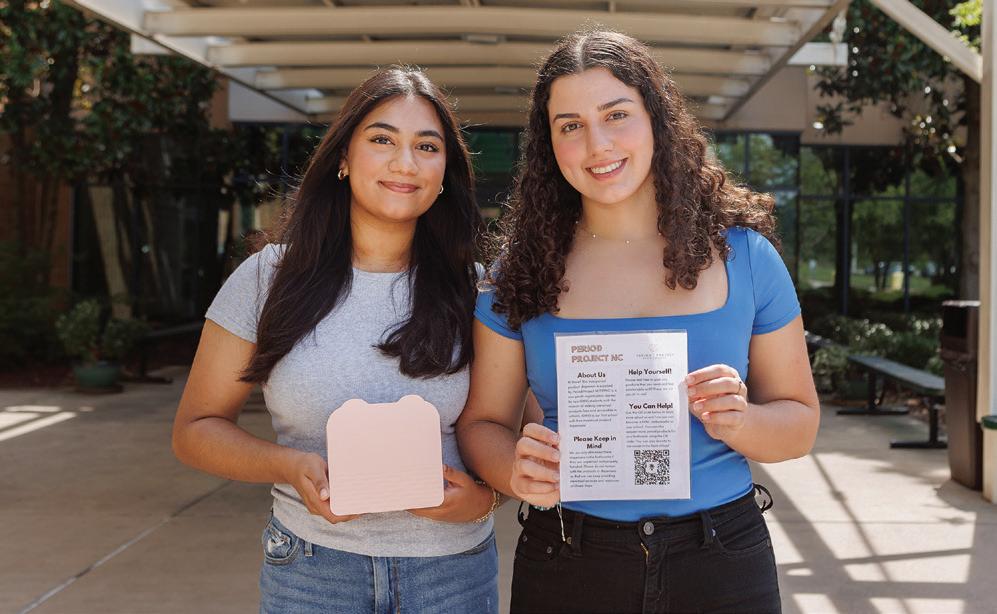
The students are working to destigmatize periods with their nonprofit Period Project NC, a journey they started last year in an effort to put free, donated period products such as pads and tampons in public school bathrooms.
“Sarah and I have [each] had experiences [at school] where we bled through our pants and had to go home,” Rosaleen explains bluntly. “We thought, ‘Oh, this is a problem a lot of people have had. It’s just not that talked about.’”
The two approached their then-principal about putting free pads and tampons in the school’s bathrooms. The administrator was initially on board, Rosaleen says, but soon started having second thoughts. The teenagers aren’t sure why, but they say the principal expressed some concerns about high schoolers misusing the products or being at risk of toxic shock syndrome (a rare condition that can occur from leaving a tampon in too long).
More likely, their principal was worried about potential backlash, says Rosaleen. It’s speculation, but in recent years, North Carolina schools have been under intense political scrutiny. Supporting discussions of sex education, or even biological realities such as menstruation, could easily turn into a public firestorm.
For girls and women statewide, however, getting a period isn’t a subject of controversy—it’s an inevitable monthly experience that has to be dealt with. And Rosaleen and Pazokian want to make it easier for elementary, middle, and high school students to get the supplies they need during the day.
There is some state funding available in North Carolina for public schools to purchase period products like tampons, pads, and even menstrual cups. In 2021, the state legislature started the Feminine Hygiene Products Grant Program, which provided $250,000 to school districts on a first-come, first-served basis. The money ran out in under one week.
Last year, the state continued the program, providing grants of up to $5,000 to 35 public school districts and 31 charter schools. The state again exhausted the funding available, receiving more than 100 applications for the grant in about a week. While both Durham and Orange County school districts were awarded grant funds, Wake County was not (and it’s unclear whether administrators applied; the INDY did not receive a response to questions for Wake schools administrators before press time).
“Our schools struggle every day to meet the needs of girls who have no feminine products at home,” stated Durham Public Schools’ 2022 grant application. The cost of providing period products each year to students in need “would surpass $5,000,” the application added.
“Many schools have community partnerships that have assisted with this great demand. With that said, this is not sustainable for these schools, and each year the support ebbs and flows, whilst the demand continues to rise.”
Rosaleen and Pazokian each got their periods young, around age 11 or 12. For Pazokian, the experience was pretty traumatic. She knew she was bleeding, but she
didn’t know what a period was or what was happening.
“I just went to school,” Pazokian says. “I bled through my pants. I bled on my chair. It was really horrible.”
With help from her teacher, Pazokian was able to get some pads from the school counselor. But that experience—having to leave class abruptly, go through adults to get what she needed—stuck with her. Likewise, at Green Hope, pads were once only available at the front office. If you got an unpleasant surprise in the middle of class, you had to cross campus and ask a school administrator for supplies.
“It’s a lot of hassle,” Pazokian says. “It takes a lot of time away from your class time, your education. And it’s also telling the teacher why you’re going to be gone for that amount of time.”
Across the globe, the number of youth who miss school due to a lack of period products is about one in 10, according to a 2014 UNESCO report. Even in the United States, where period products are plentiful, students or their parents may not be able to afford them. In North Carolina, about one in four teenagers has missed class due to lack of period products, according to the Alliance for Period Supplies.
When Green Hope got a new principal, Alison Cleveland, last year, the girls again approached her about installing period product dispensers in the bathrooms. They tried to keep the proposal as simple and straightforward as possible, lobbying only for pads instead of pads and tampons. This time, they got a firm yes.
“The need was definitely there in our school,” Pazokian says. “A lot of our friends had had similar experiences of bleeding through. So from the female population of our
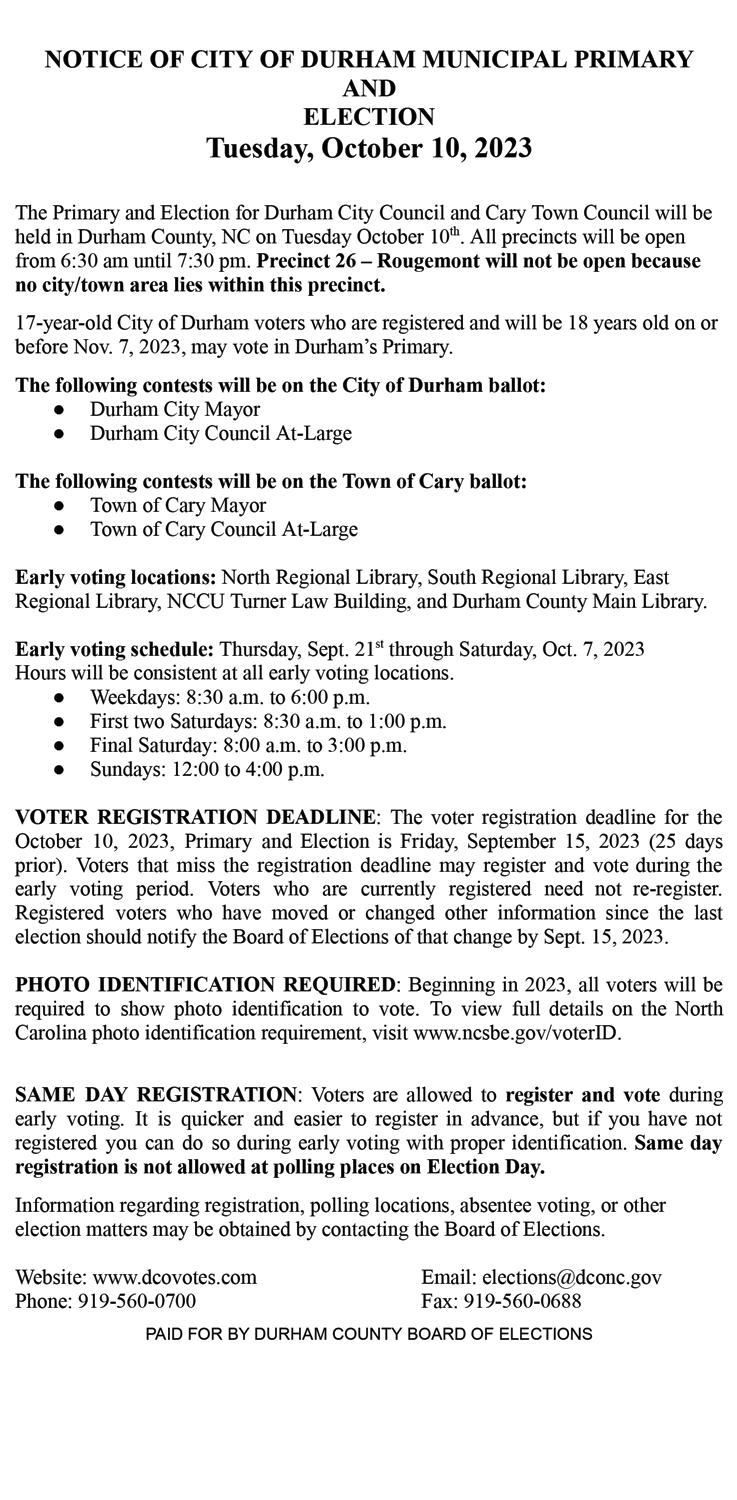





school, especially, we got a lot of support and people were very open to it.”
The response from the boys in school has been more mixed, Rosaleen adds. Some classmates thought it was weird when a male student supported Rosaleen and Pazokian’s endeavor. That’s a problem, Rosaleen says, because “we do have a lot of support from girls, but boys are half of the population. They also have to be a support.”
“People think it should be something women should have to fix,” Pazokian adds. “That the burden should be on us …. And now, especially, more girls’ periods are irregular. Not everyone knows exactly when they’re going to get their period, so it can be hard to be prepared or know … ‘I should especially be stocked up around this time.’”
Rosaleen and Pazokian’s success at Green Hope has helped them a lot as they try to get dispensers installed at other schools. Once principals learn one public high school has already implemented the duo’s vision, they’re more open to the idea, says Rosaleen. Getting dispensers installed in the first school, Green Hope, was the hardest part, she adds.
In an effort to expand their operation, the teenagers recruited about 120 “ambassadors” who advocate for the project in their own schools and help restock the dispensers.
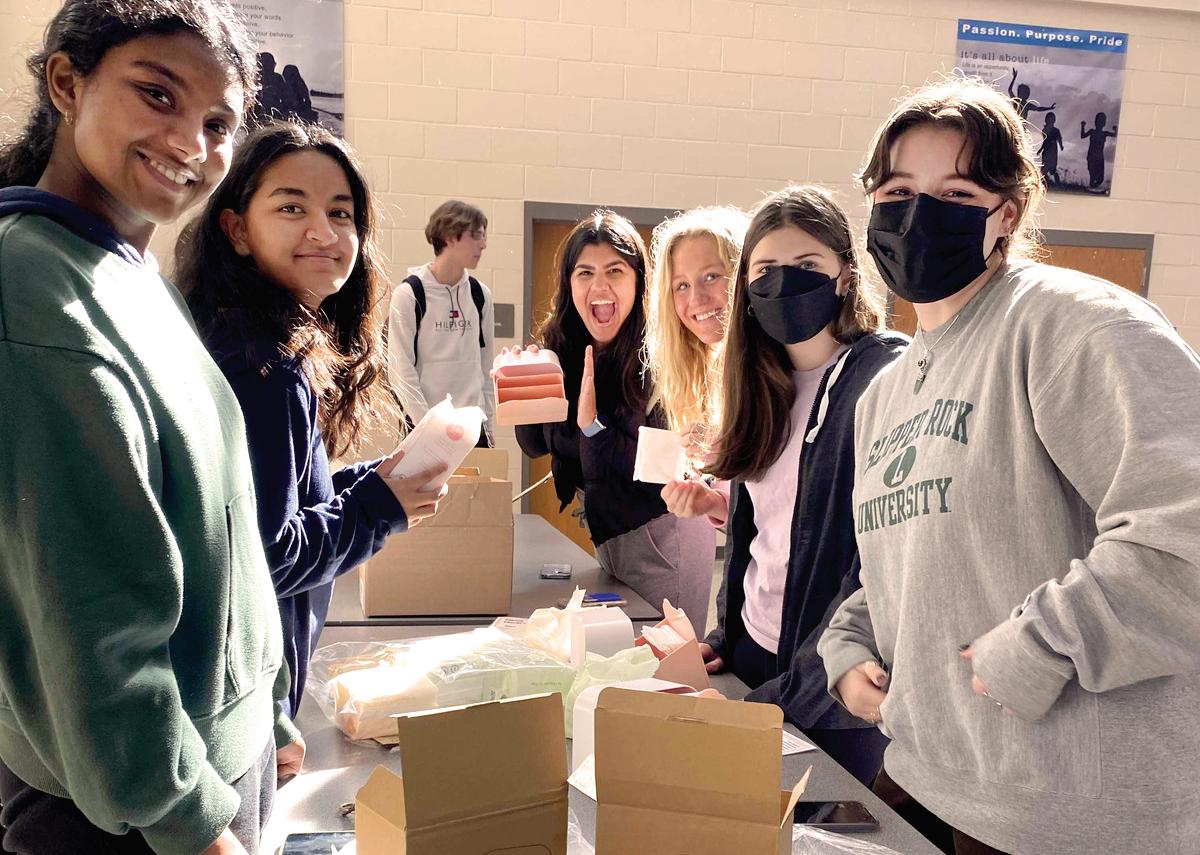
“It definitely helps,” says Pazokian. “The more ambassadors we have in a school, then the more likely that will be the school that we implement into next …. If we don’t [attend] the high school, we aren’t as trusted. But if it’s someone from
their own school who says, ‘This is a need I’ve seen,’ then that’s better.”
Today, the duo has successfully installed dispensers at Panther Creek High School in addition to Green Hope. This coming school year, they will also expand the project to Apex Friendship High School and Lowe’s Grove Middle School (in Durham). Rosaleen is especially excited about installing dispensers at Lowe’s Grove, she says, because the school has a significant population of economically disadvantaged students.
Period Project NC isn’t only about providing free period products to students who can’t afford them, but the need is definitely there, Rosaleen and Pazokian say. About 40 percent of women in the United States struggle to afford period products, according to the Ballard Center. Pads and tampons can cost up to $240 per year, according to the National Association for Women. And taxes on period products, like the 4.75 percent tax in North Carolina, only increase unaffordability.
“I remember our first week, all [the dispensers] were completely empty,” Rosaleen says. “That was the best feeling, because I did wonder if people were actually going to care or use them.”
Rosaleen and Pazokian say they hope
to continue to expand the project and install dispensers in more schools across the state. They’re always looking for more ambassadors, as well as continually accepting donations for the purchase of dispensers and period products.
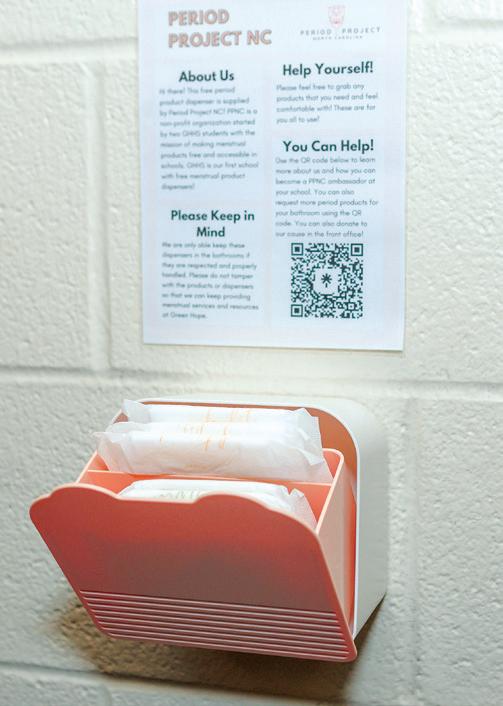
This summer, Rosaleen also traveled overseas to donate period products to a school in rural Bangladesh. One day, she hopes to become an OB/GYN to advocate for women’s health and provide essential care to women in Middle Eastern, North African, and South Asian countries. But even in the United States, we have a long way to go.
Providing free period products to students “levels the playing field,” Rosaleen says. It also sends a message to female students that their education is just as much a priority as their male peers’, Pazokian adds. The positive response the project has received proves it’s needed, the duo says.
“It’s just very securing to know that I don’t have to worry about my period when I’m at school,” Rosaleen says. “At Green Hope especially, not a lot of the students are thinking about the fact that there are people at this school who can’t afford period products. It gives me peace of mind knowing that they have peace of mind.” W
“People think it should be something women should have to fix. That the burden should be on us.”
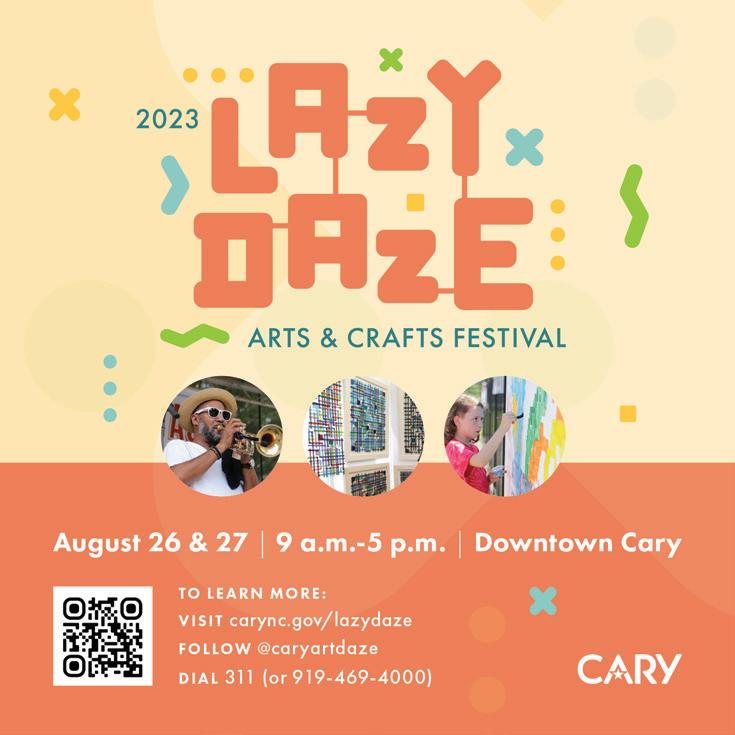



Brittany Dash was doing everything right. She worked a good job at a bank. She rented a house on an archetypal Durham street. And she took care of her family—not only her five-year-old daughter, Khloe Fennell, who was born with a heart condition that required multiple surgeries, but also her cousin Brian Luster, who was staying with her while he battled addiction.
On July 5, everything went wrong.
While Dash was at work, Luster called 911 to say he was overdosing. Then dispatchers heard him arguing with Dash’s 15-year-old niece, Destiny Sidberry, who was babysitting Fennell and a younger cousin.
By the time police arrived, Luster had retrieved the pistol Dash kept locked up in the house. Sidberry pushed the younger cousin into a closet to protect him, then dove between Luster and Fennell.
Sidberry was shot seven times, but it wasn’t enough to save Fennell. The five-year-old died from her five gunshot wounds.
“Tell Brittany I tried,” Sidberry reportedly told the police. (Thankfully, the teenager survived.)
Fennell’s murder shook Durham, but not nearly as much as one might think, given the central role crime has played in local politics over the past four years. In the midst of the George Floyd uprisings and a nationwide spike in murders, it was the central issue of the 2019 and 2021 Durham City Council elections.
In part, the relative quiet is because the question of Durham’s crime prevention strategy appeared to be set-
tled in 2021 when Durham voters decisively elected a moderate slate headed by Mayor Elaine O’Neal that called for both police-friendly tough-on-crime measures and investment in social programs.
But while murder rates are declining across the country, violent crime increased in Durham: through August 5, shootings are up 22 percent compared to 2021 and 28 percent over 2022.
What appears to be a détente in the debate over police reform might prove to be little more than a temporary cease-fire. A single shooting could still spark a political firestorm at a moment’s notice, and the legacy of marquee crime prevention strategies of recent years—including HEART and ShotSpotter—will depend on the next council’s budgets.
Like the country’s as a whole, Durham’s violent crime rate is still far below the highs of the early 1990s, even with recent upticks. But even focusing only on the last five years, it’s simply not true that the city is suffering a violent crime wave: it’s that specific populations in specific parts of the city are.
Durham’s violent crime is localized to a handful of neighborhoods—including the East Durham blocks surrounding Dash’s home on North Guthrie Avenue. According to data from the 2021 Durham Gang Assessment
Report, one census tract surrounding Alston Avenue and Lawson Street had 2,544.8 homicides and aggravated assaults per 100,000 people. The city average is 337.8. The 12 most violent tracts account for 15.4 percent of the city’s population, but 60.4 percent of its homicides.
Unsurprisingly, the trends mirror poverty, which means they also mirror race. The per capita income in the Alston tract, which is 10.3 percent white and 67.9 percent Black, is just $9,943. Safer areas of the city, like one tract in Watts Hillandale, is 77 percent white, 6.5 percent Black, and has a per capita income nearly 4 and a half times higher at $45,335.
“If that had been a white little child? Oh my gosh,” says Camryn Smith, cofounder and executive director of Old East Durham’s Communities in Partnership. “But because it was a Black little girl with a Black single mom living in a gentrifying but still majority-Black community, everybody was like, ‘Oh, so sad.’”
Fennell’s murder obviously stands out for her age, but Luster, at 42, is also an outlier. Within areas plagued by violence, it’s the young who are most involved—as perpetrators and victims both. Four of the 12 people arrested for murder so far in 2023 are juveniles, and the median age of all murder arrestees is just 25.5, according to an INDY analysis of Durham Police Department data. For all gun-related arrests, it’s 27. Nearly 40 percent of all shooting victims this year have been 20 years old or younger. Over 80 percent of this year’s 125 Durham shooting victims through August 5 were Black, and the








same proportion were male. Just 2 percent were white.
“Any guidance counselor or principal in [Durham Public Schools] can name the kids in their building that they’re really struggling with,” says city council member Javiera Caballero, who is running for reelection this fall.
Given those trends, every elected official in Durham is clear that violent crime won’t disappear unless the realities of poverty, inequality, unmet mental health needs, and other social ills are addressed.
“Let’s get to the root of it and work on that part,” says city council member and mayoral candidate DeDreana Freeman, echoing a talking point virtually every candidate for public office shares.
In addition to violence interruption and youth internship programs, the heart of the effort is the Community Safety Department (CSD), created in 2021.
With four unarmed crisis response teams collectively called HEART, CSD provides first responders with expertise in mental health care and a team that helps residents navigate care after the initial incident. The program is designed to support people like Luster long before they pick up a gun; Luster accrued more than 50 charges over the 20 years preceding Fennell’s murder.
HEART has proven to be effective and popular, leading the city council to expand its budget for 2024. It had limited hours and geographic scope during its pilot year but will now respond to calls across the entirety of the city for 12 hours per day.
“It’s been successful because people’s needs have been met,” says Caballero.
If that success has helped quiet the political debate over police reform, it hasn’t ended it. The persistence of violent crime means many in Durham are still leery of diverting funding away from traditional armed police officers, and the next city council will have to chart the path forward.
“It was really helpful to come up with a pilot program for interventions with unarmed respondents,” says Freeman. “But that doesn’t address the very real issue of someone showing up with a gun and pulling the trigger.”
The talking points have become well worn over the last four years.
The defining question of both the municipal budget and the city council election in 2019 was whether the Durham Police Department needed more sworn officers. Then police chief CJ Davis requested 72 of them. After the grassroots abolitionist organization Durham Beyond Policing led a campaign to instead fund a Community Safety and Wellness Task Force to explore alternatives to policing, the request was reduced to 18 officers.
The progressive majority on city council, led by then mayor pro tem Jillian Johnson, rejected those positions, too, opting to increase wages for the city’s part-time workers instead. After Davis left Durham to lead the Memphis Police Department, many speculated the lack of financial support was a motivating factor. (Davis’s tenure in Tennessee has been defined by the murder of Tyre Nichols by a specialized unit she created.)
Two years later, with the task force’s work under way, Durham Beyond Policing joined with Durham for All— an organization born out of Johnson’s original campaign team—to spearhead the fight for HEART. The groups asked that the funding for 60 vacant police positions be moved to the new department instead. (Disclosure: I took part in the campaign as a volunteer member-leader with Durham for All.)
The effort fell flat. CSD and HEART were created, but only five police positions were transferred, resulting in a much smaller pilot program.
When Durham voters later that year elected O’Neal and Leo Williams and reelected Freeman and Mark-Anthony Middleton, all of whom share a more moderate approach to crime that includes continuing to invest in policing, it
seemed like the possibility of any major transformations to Durham’s public safety approach had ended.
“To say that we’ve reached a point where we need more mental health responders and we can freeze police—to me it’s just unintelligible,” says Middleton. “I don’t know what that means in terms of practical policy making.”
As the city grows, it will have to expand the police force at the same time, Middleton says. He also championed the use of new policing technologies like the gunshot detection system ShotSpotter that he says could increase police efficacy.
“A lot of the debate—I’ve said this time and time again— is entrenched in ideological talking points,” Middleton says. “It’s almost reflexive. It doesn’t matter what the data says for some folk.”
Many more moderate voters represented by the Durham Committee on the Affairs of Black People (DCABP), which endorsed all four 2021 election victors, echoed Middleton’s views. They saw the progressive campaign as little more than rich, white liberals from safe neighborhoods imposing their political ideals on the Black Durhamites who were at risk.
“People in my community tend to look at the situation as ‘We want to be safe,’” says Omar Beasley, a former DCABP chair. “And if we’re not, and if the alleged criminals aren’t being held accountable, then crime is going to continue to trend in the wrong direction in our community, like it has been the past few years.”
Many national polls have corroborated Beasley’s perception, showing that while Black Americans tend to be critical of police, they also tend to support increased police funding. One Pew poll even found that Black and Hispanic Democrats are more likely to prefer increased police spending than white Democrats.
“At this point, I think there is still plenty of space and imagination to espouse a desire to live in a Durham that is beyond policing,” says Jesse Huddleston, a member of the Community Safety and Wellness Task Force. “And it’s really important to meet real people where they are.”
“From my vantage point,” they add, “it does not make sense to me to stand on a soapbox and say, ‘Get rid of a resource’ when the General Assembly is already making it hard for Durham to have resources.”
However, there are important divisions among the Black population.
How much confidence Black Americans have in the police differs starkly between age groups, and a Pew poll found differing levels of optimism about change depending on education level and income. In that light, it’s worth
“It was really helpful to come up with a pilot program for interventions with unarmed responses. But that doesn’t address the very real issue of someone showing up with a gun and pulling the trigger.”
“A lot of the debate is entrenched in ideological talking points. It’s almost reflexive. It doesn’t matter what the data says for some folks.”
noting that both Durham Beyond Policing and Durham for All have Black leadership.
“I want less police,” says Muffin Hudson, director of the NC Community Bail Fund and a leader of All of Us or None of Us NC, a group advocating for the rights of formerly and currently incarcerated people and their families. “The people that I know want less police.”
Ironically, Hudson, an avowed prison abolitionist, is also an ally of Freeman’s, despite their disagreement on policing.
“Me and DeDreana don’t get along like that,” Hudson says. “Just because we’re both Black women and we’re both from New York does not mean we get along. We have some arguments.”
Her loyalty stems from trust.
Hudson says she knows that Freeman, an East Durham resident herself, is honest about her opinions and is committed to her community—especially in the emotionally raw times right after violence strikes.
“It’s always about the people,” Hudson says. “It’s never about her. It’s never her personally saying, ‘Well, this is what I want.’ It’s what the people are telling her they want.”
The fact that the priorities page on Freeman’s current campaign website doesn’t mention violence or policing at all could be a sign that her constituents are asking for a different focus this year. But for Freeman’s progressive council colleagues, it shows a political shift that she has been less than straightforward about.
“The political climate around policing was very intentionally shaped by certain political actors who thought that it would give them an edge over the folks who were holding power in the council at the moment,” Johnson says of the past two elections.
Now that the more pro-police council members are in the majority, it’s not a politically convenient issue. The fact is, progres-
sives like Johnson say, the root causes of violent crime are too big and too complex for local government to solve.
City governments in North Carolina don’t have the authority or resources to outlaw guns, pass jobs guarantees, increase the minimum wage, or anything else that would target the issues everyone agrees are central to the problem. But that doesn’t make for a good stump speech.
“The lethality of the actual by-product of having so many guns on the street—it’s impossible to really curtail the violence that we’re seeing,” says Caballero. “I understand why residents don’t want to hear that, because it means, ‘Oh, you don’t have a solution to my problem locally.’
“I’ll say this for everyone who’s an elected in Durham: We all care. We all feel it. I think some of us are willing to be a little more transparent about what we can actually do about it.”
Jennifer Carroll, a medical anthropologist and member of the Community Safety and Wellness Task Force, sees the issue in the same practical, data-focused way Middleton does—but reaches the opposite conclusion.
While Middleton sees the increase in police response as a sign that enforcement-focused approaches like ShotSpotter are working as promised, Carroll sees activity without effectiveness.
“When we had conversations with city council about ShotSpotter, there was a shocking disregard to available data,” she says, citing evidence from Chicago that the system increases police dispatches but seldom leads to arrests or case closures.
Given the constraints of local government and the size of that problem, the issue ultimately comes down, as it always has, to prioritizing money. Whether ShotSpotter is effective is not a question answered in iso-
lation; it’s answered by comparing it to the impact of HEART or increases to the police staffing budget.
“If we funded more mental health services for folks, if we funded more affordable housing for folks, if we put more money into people’s hands and into their pockets, we would have less crime,” Hudson says of her support for defunding the police. “We would have less need for police officers because people have everything they need, and that’s when crime happens: when someone’s lacking something.”
There’s plenty that the city could spend money on. Caballero points to parks and rec programming that provides opportunities for young people, as well as improved partnerships with the county, which controls both the schools and social services and thus directs support for the young people who need it. Williams has championed an apprenticeship program to connect those who might commit violent crimes with jobs that offer a better path. Freeman’s focus on development is explicitly aimed at bringing resources to divested communities, and of course there was the tight budget vote that centered on raises for firefighters and police officers.
But there are two issues.
The first is that the conflicts dividing the city council have made it hard for such mundane and routine local government projects to find a foothold.
“It can be hard to know who we bring in or who we reach out to for support on a particular proposal if we don’t know if the other city council members are returning your call this week,” says Carroll. “Are we going to accidentally weaken a proposal we feel is very helpful for the community if we pick someone in the middle of an interpersonal conflict that we’re not able to be aware of?”
“It’s just disheartening when you see the posturing of public officials,” says DeWarren Langley, a longtime activist focused on mentoring Black boys.
Langley cites a lack of communication among local officials for duplicative and ineffective spending. For example, Williams is pushing for a commission on Black youth, but the county already has a similar program in My Brother’s Keeper.
“When it’s nearing time to run for office, you see a focus on a particular issue in order to have leverage for the next election cycle, when, as someone who’s always been engaged, [I have] emailed for two years about boys and young men of color and [gotten] no response,” Langley says.
On top of it all, a new state law has made it possible for HEART to expand even further. Senate Bill 77 allows cities to send unarmed, civilian personnel to respond to some traffic crashes. For a program that has already seen a massive public campaign for funding, it’s an opportunity sure to garner public backing.
Which leads to the second issue: whether the city can afford to maintain or expand HEART, internships, commissions, job training, ShotSpotter, recreational programs, violence interrupters, and all the other pilots and programs aimed at addressing violent crime.
“The city’s money is public money, and we don’t have an infinite supply of it,” Johnson says. “Future councils are definitely going to have to make some hard choices with that, and whatever they do will be controversial.”
Caballero points to the major corporations moving into Durham as a potential solution. “What are you actually giving us?” she asks. “And if they’re not giving it, then let’s publicly shame them. Like, you’re this big employer, what are you providing for Durham? What are the actual dollars to do the things we need, because you elevated our cost of living.”
In other words, the question of how to fund the robust, holistic response to violent crime that everyone in Durham politics desires dovetails with the question of growth.
Middleton makes the connection even more explicit.
“This [year’s] budget is a $600 million budget, almost a $40 million increase from last year’s budget with no tax increase,” he says. “Why did that happen? Because Durham’s an it city. Because Durham’s hot. Because more people are moving here and helping us pay our taxes, enlarging our tax base.”
“And why are they able to move here?” he asks. “Well, because of development.” W
This is the second story in a four-part series covering Durham’s upcoming municipal election.
“I’ll say this for everyone who’s an elected in Durham: We all care. We all feel it. I think some of us are willing to be a little more transparent about what we can actually do about it.”
One afternoon at Jordan High School in September 2021, Michelle Needham could’ve sworn she was in the middle of a zombie apocalypse.
Needham, curator at the Museum of Durham History (MODH) and mother of two Jordan students, was dropping something off at the school’s office when she noticed a few high schoolers coming out from behind a building for their lunch period. In-person learning had just started back up, but things were as strange as ever, Needham says.
“They were all in masks and came out very slowly—I think it was their lunch period,” Needham says. “They [sat by themselves] and then they went straight to their phones and ate their lunch. It was just so non-teen; they all sat separately and it was so quiet and surreal.”
This moment stuck out to Needham, like a particularly unsettling thriller you can’t shake off. But not just any thriller: it reminded her of Stranger Things, the Duffer brothers’ sci-fi television show that was strongly inspired by their childhood in Durham—and their time as students at Jordan High School. Suddenly, the two things—COVID-19 and Stranger Things were inextricably linked in Needham’s mind. She pitched an idea to the MODH’s director, and an exhibit was born.
Stranger Times will open on September 8 at the MODH, exploring the Duffer brothers’ childhood in Durham and foray into filmmaking, as well as the similarities between the show and aspects of the pandemic, paying particular attention to the latter experience from a teenager’s point of view.
The exhibit will share students’ narratives through a variety of media, includ-
ing video, audio, and written records. The museum staff and students have brainstormed ways to utilize the building’s small space to the fullest, even extending some of the exhibit outside under a gazebo and using walls to separate parts of the exhibit.
The beginning of quarantine in 2020 may not feel that long ago, but history doesn’t have to be ancient to be valuable, Patrick Mucklow, executive director of the MODH, emphasizes.
“A lot of times people have a misconception that history is all just old and ancient and from decades, hundreds of years past, but there is a lot of history being made right now, and recent history is also important,” Mucklow says.
In curating the exhibition, museum staff didn’t consider just one teenage voice: Needham interviewed eight high school students with different identities and backgrounds, asking them questions about their personal experiences throughout COVID-19, about observations they made within Durham’s teenage community, and how the pandemic has affected their education, specifically regarding social dynamics, intersectionality, and racial and class divides in school.
One of those students, Gretchen Poore, spoke with Needham about being in seventh grade at the beginning of the pandemic and losing formative experiences like school band and in-person class.

“Having online classes actually took away some of the social stresses of middle school, which is really good,” Poore says. “But I also lost a lot that year. I just didn’t have that many close friends anymore because I didn’t see people, and in order to maintain relationships with people, you’d have to put in a lot more effort to be able to safely see them.”
During this time, Poore says she learned a lot about privilege and the way that race and class can advantage certain groups while harming others.
“The first kid to die in North Carolina from COVID in 2020 was a girl that was at my elementary school,” Poore says. “It was this Hispanic girl in third grade and it just put things into perspective about how a lot of people from middle or upper middle class who are white didn’t really worry about COVID as much, but for some people, it really was right here in Southwest Durham.”
These realizations, among others, made some kids like Poore grow up a little faster. But Poore also noticed that the pandemic has slowed the maturity of some of her peers who may not have gotten the support at home that they needed to build on their social skills. This stagnation also contributed to a rise in mental health issues like anxiety and depression among adolescents, with one study showing that, between 2018 and 2020, there was a 25 percent spike in the number of youth experiencing mental health problems. During the first couple years of the pandemic, there was more of a spotlight on the plight of teenagers and youth. Since then, it’s faded away from the public eye.
Interviewing students for Stranger Times was one small way to bring awareness to
what young people have gone through, Mucklow says.
“A lot of times we look at historic records for what young people or kids were thinking a long, long time ago when they were going through, you know, the Spanish flu or something like that,” Mucklow goes on. “But there isn’t a lot documented, because no one ever thought to ask the kids how they felt. And we wanted to change that— we wanted to make sure that they were on the record and they did have a voice.”
And as September approaches and school begins, nothing feels more reminiscent of fall than Stranger Things. Needham says that ’80s music will be playing on the exhibit’s opening day on September 8 and that visitors are invited to dress accordingly, whether they layer a classic Eleven flannel or pop on a Dustin snapback.
But no matter how the exhibit turns out, Poore hopes that Stranger Times will encourage more dialogue and understanding between youth and older generations.
“I hope that people in older generations realize that the experiences of teenagers shouldn’t be shoved to the side and that every generation has something they experience that is difficult,” Poore says. “And for teens, I want them to know that we’re all in this together. It was a traumatic time for so many people, but it was a traumatic time together.” W
A new exhibition looks at recent history through the eyes of teengers—and the Duffer Brothers.Students Ava Kinghorn and Gretchen Poore



























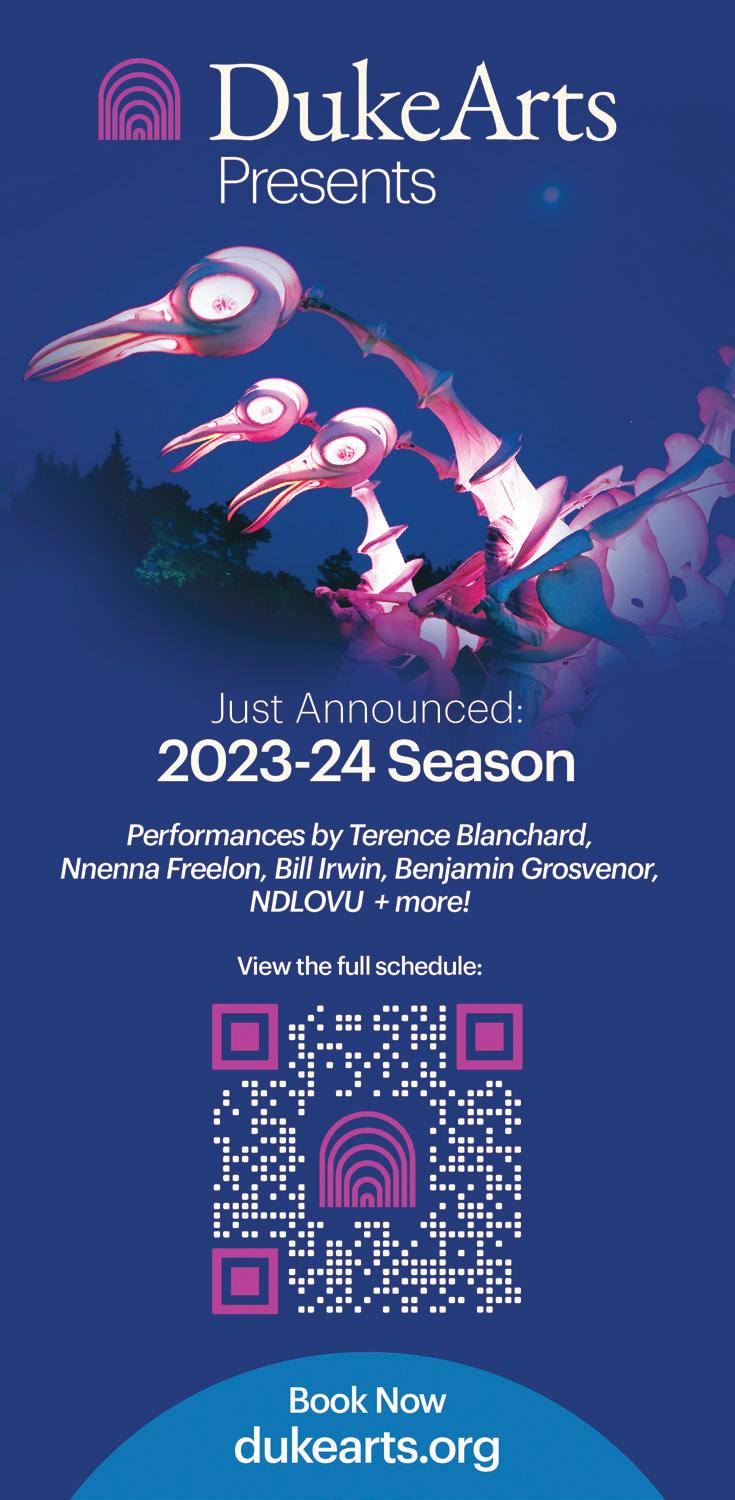
HOPSCOTCH MUSIC FESTIVAL
September 7-9 | Various venues, Raleigh | hopscotchmusicfest.com
M any local bands dream of sharing a bill with an act like Pavement.
Playing tennis with Pavement? Probably not so many. Dear Blanca, an explosively rumbly indie rock band from the capital city of South Carolina, is poised to realize both dreams during the Hopscotch Music Festival in Raleigh, where they will open for their good friends, LA-based trio The Sloppy Boys, in a small underground club.
Dear Blanca singer Dylan Dickerson says that when his group was added to the lineup for the 2023 event he dove deep into Pavement’s catalog, which he didn’t know well. Enamored, he dug deeper, discovering that the band’s Stephen Malkmus and Bob Nastanovich had an affinity for tennis, a sport he’d gotten hooked on in the past year.
“I tweeted at Bob and he got back to me and seemed interested,” Dickerson recounts of how the conversation about playing got started. “Stephen tends to bring his rackets anyways and likes to try to squeeze hitting a round in whenever he can.”
After the tweet, Dickerson had Nastanovich on his podcast, and plans solidified. They now have a text thread going about it.
Festival director Nathan Price reports he’s “oh so aware” of the potential for a Pavement–Dear Blanca tennis match.
“I love it,” he says of the opportunities locals get to rub elbows with artists they admire and play for packed rooms. “I haven’t been able to play Hopscotch in years because I’m always so busy. But when you’re playing in that setting where you’re in a full crowd, everybody’s into it, it just feels like how it should feel. And I love hearing from an out-of-towner about a discovery they don’t know, isn’t a huge band, like, they’ll talk about a Dear Blanca or somebody as their big discovery that weekend.”
The chances for popular regional acts to play sports with indie rock royalty and for locals to play crowded venues gets a boost when Hopscotch returns September 7-9. For the first time since the pandemic shut down the event in 2020—and heavily altered it for the next two years—the festival is bringing back ticketed club venues. In 2021, there were no official club shows, just two out-

door main stages in Moore Square and City Plaza. In 2022, free, mostly local late-night shows were added at Slim’s and the Pour House, both mainstay clubs from the festival’s first decade, when the indoor programming spanned 10 or more clubs and went from the early evening into the wee hours.
This year, the festival announced that it would have official, pass-required shows at six clubs, also bringing back four other previous hallmarks in Lincoln Theatre, Kings, Neptunes, and the Wicked Witch. When the official schedule dropped, it added Nash Hall and firsttime Hopscotch venue Transfer Co., bringing the final number up to eight. And those club shows are once again filled out with some exciting touring acts, including SNL star Sarah Sherman (headlining Hopscotch’s first-ever comedy stage), The Sloppy Boys, acclaimed hip-hop artists Prince Paul and Kool Keith, free jazz legend Jeff Parker, thrash-punk forerunners Cro-Mags, and more.
Price says the late venue additions were partially due to the festival not knowing if it would be able to use them— but also because high ticket sales made it attractive to have two more places for Hopscotch to spread out its crowd.
An array of club options has always been crucial to Hopscotch, serving as the crux of its choose-your-ownadventure concept (the festival is named after a 1960s stream-of-consciousness novel that can be read in different sequences). Previous years have given attendees the chance to jump between rock and hip-hop, offbeat pop and heavy metal, various shades of folk and country, and a host of experimental outliers—much of it delivered by world-class artists who rarely tour through the state.
But Price says he thinks the renewed excitement around this year’s festival is about more than the return of a proper club lineup.
Booking the main stages this year with acts that got closer to the heights reached by previous festivals—which hosted towering names like Solange and Public Enemy, James Blake and Run the Jewels, Dwight Yoakam and Spiritualized—was a top priority, an effort to reclaim the prestige Hopscotch held prior to the pandemic.
The headliners at this year’s festival get close to that level. There’s indie rock giants in Dinosaur Jr. and Pavement (who last played in North Carolina in 1999, and whom Price has described as the festival’s “biggest get ever”). There’s an emo luminary in American Football (who has never played in the state). There’s a rapper, hot as anyone around, in Denzel Curry. There’s an exceedingly popular indie-popper in Japanese Breakfast and an equally well-liked country songstress in Margo Price.
Still, the return of clubs in earnest for the first time this decade is what makes this year’s lineup really feel like Hopscotch again.
This year’s Hopscotch lineup boasts the return of small clubs—and a renewed chance for local acts to play shoulder-to-shoulder with music legends.ILLUSTRATION BY NICOLE PAJOR MOORE
And it’s a big deal for Raleigh’s club landscape, which is waking back up as people return to it.
Kings, the eclectic rock club institution that launched in its second location in 2010 at the inaugural Hopscotch, started its slow reemergence from the pandemic at last year’s festival with a few day parties. This year’s Hopscotch will serve as another point of transition as Paul Siler and Cheetie Kumar are in the midst of working out a deal to hand over the club’s reins to a longtime member of the local music scene, with the details to be announced in the near future.
Siler says he and Kumar (guitarists in long-running Raleigh rock band Birds of Avalon) are excited to see the club go to a team that understands the local music community and knows how to keep Kings going into the future. Siler and Kumar will still be an active part of that community, planning to host shows on the patio at their new restaurant, Ajja, located in Raleigh’s Five Points neighborhood, just outside of downtown.
As for the other two floors in the couple’s triple-decker downtown nightlife hub—Neptunes, the cocktails-anddance-focused bar in the basement, and Garland, the former restaurant on the ground floor—Siler says they have already handed off the lease for Neptunes and have lined up a good person to take over the Garland space.
Siler is intimately acquainted with Hopscotch, having steered Kings and Neptunes through its energetic chaos throughout the 2010s. He’s happy to see the festival getting back to itself.
“When they made the announcement of the lineup, it just felt like it had the best reaction and reception of any Hopscotch since, like, maybe the first one or the third one,” Siler says, explaining why that’s a big deal when you own a rock club in downtown Raleigh. “This business does not guarantee that it’s going to be enough money— I mean, most of us who do this have other jobs—so it’s nice to know that for three days of the year, you’re going to be busy.”
“Every year that Hopscotch happens, and I walk outside our building, the energy on the street and the type of people that come to Hopscotch, and the feeling around it, I’m always just like, ‘God, I wish this was the way Raleigh was all the time,’” he adds.
And while Hopscotch also highlights some issues he sees with downtown—whether the people who attend or play the festival could afford the apartments going up in the area, for instance—Siler says the event instills hope, allowing him to revel in what downtown can be at its best.
Adam Lindstaedt, who owns the Pour House, echoes many of Siler’s sentiments, calling this year’s lineup the best he’s seen in a while.
With his business expanding its purview—working to establish the first mass-production-capable vinyl record plant in Raleigh—he’s eager for excitement to return to the local music scene.
“It’s the most magical time of year for live music in Raleigh,” Lindstaedt says. “Everybody’s out, everyone’s happy, they’re doing it all day and all night.”
The club does great revenue during the event, typically bringing in over four days what it would during a couple weeks of OK business, with a little more than half of that coming from day parties, and while Lindstaedt says the club hasn’t really seen a dropoff during the past two COVID-altered years, he does see key advantages to being
included on this year’s proper club lineup.
“If you buy a club ticket and you’re being able to bounce around from place to place, odds are you’re probably going to stop by at some point,” he says of getting to showcase the club to people who might not know about it—or who, after the pandemic, just need a reminder.
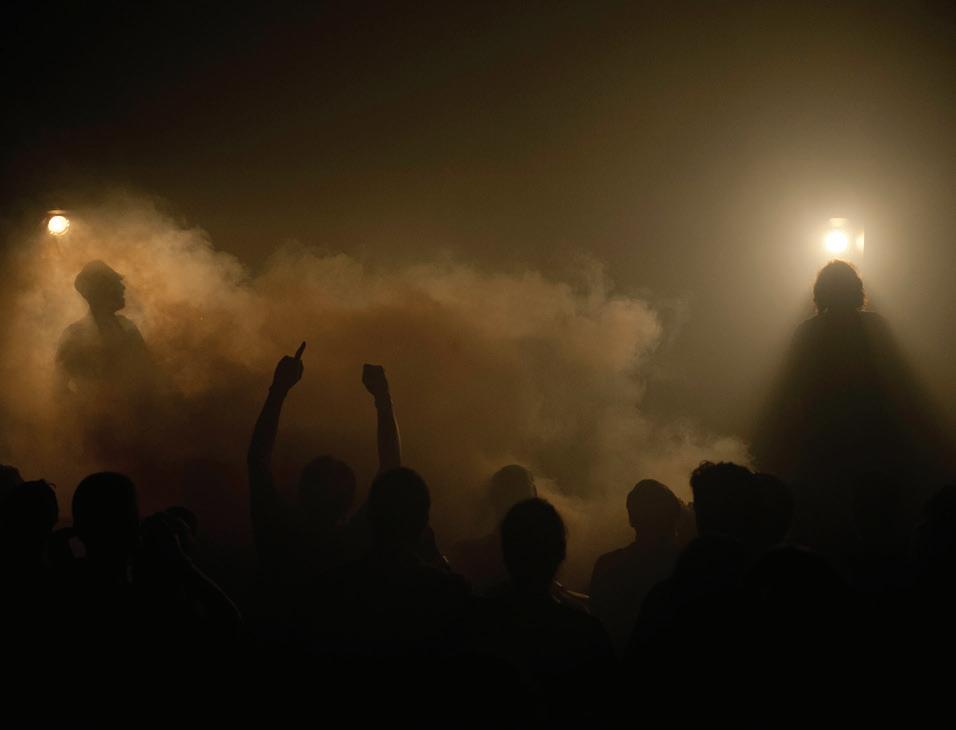
And the clubs offer opportunities for acts outside of rock, folk, and pop.
Abyssal Frost, a relentlessly churning black metal band from Atlanta and Charlotte that’s playing an official set at this year’s Hopscotch, is timing the release of its first single from its second album to line up with the festival, in hopes the appearance can amp excitement for the new record.
“It’s a massive, massive opportunity for us to be able to be not only just playing live in general and having that whole ecosystem moving towards a place where it’s thriving again, but then especially something like Hopscotch,” Abyssal Frost’s Kenan Kerr says. “We know that we’re going to have national acts, so we’re going to have that attention.”
Durham’s Jooseloord, an aggressively thoughtful rapper who is returning to the festival for another official set, also emphasizes the opportunity festivals provide to connect with bigger artists and new audiences, explaining that these advantages are increased when the event happens where you live.
“I feel like it evens out the ground more,” he says of playing Hopscotch alongside bigger national names like Kool Keith and Prince Paul. “A lot of times, especially if somebody is in your wheelhouse, they’ll reach out to you
beforehand and be like, ‘Where can we do this? Where can we do that?’ Because you’re an act that’s booked up there as well and they know that people know of you.”
Kym Register is the owner of Durham’s Pinhook rock club and a stalwart local musician who emphasizes bringing “a queer lens to the Southern rock ethos,” per the website for their band Meltdown Rodeo. Having played the festival several times in the past and returning this year with that new outfit, Register is excited for the opportunity Hopscotch provides to a diverse range of acts, and expresses hope that this aspect will expand in the future.
“I think every white-man-run organization or whiteperson-run organization, including the Pinhook, all of us should have meetings or conferences or groups of people that aren’t involved in the organization to speak out and to get information from about how it could be more inclusive, because it’s hard to see that when you are the majority,” Register explains, circling the idea of bringing in outside artists to curate more shows as one way Hopscotch could accomplish this.
Having at least one artist-curated stage was a hallmark of the festival in previous years and, like the expanded club lineup, it’s also coming back this year. The festival has teamed with local hip-hop collective Raleighwood to program the Thursday night bill at Kings.
“We tried to have it as diverse as possible. I think we did a pretty good job, especially on the main stages again,” Price, the festival director, says of this year’s lineup. “We tried real hard to make sure that it was as diverse as possible. And not just, you know, a bunch of indie bands.” W


If you’re going to this year’s Hopscotch, I imagine you don’t need me to hype you up further for the likes of Pavement, Denzel Curry, and Japanese Breakfast on the main stages. So let’s get you hyped for the many dynamic acts playing this year’s clubs, offering you the opportunity to bounce through a litany of different sounds long into the night. Here’s one act to see at each of this year’s eight indoor spaces. But these are just our picks: use them as a jumping-off point to choose your own adventure.
FRIDAY FRIDAY
Across her last two albums, Saxapahaw–via-Philadelphia musician Rosali has emerged as one of indie rock’s best guitarists and songwriters, punctuating her soaring warble with guitar lines that paint pretty lattices in the background until they explode into the stratosphere. Regardless of how stripped-back the accompaniment is at Hopscotch, her two instruments should fill the two-story Pour House perfectly.











SATURDAY SATURDAY THURSDAY
Local rapper Lesthegenius delivers his lines in a way that makes you feel like you’re living through them. His deep and commanding voice and the undulating rhythm of his flow matches bars that often find him stumbling over obstacles before steadying himself and pushing forward with determination. Tap into his energy at Kings and let it fuel the rest of your night.
I put off listening to Cable Ties’ Merge Records debut, All Her Plans, until this year’s schedule dropped. Bad call on my part: it rips. If you’re looking for a band that scrambles familiar, classic rock with punk elements in a way that’s somehow still distinct, this Australian band’s searingly anthemic jams are for you.
I love seeing large crowds in Hopscotch’s biggest rock club vibe to experimental excellence—Tortoise and Battles are two highlights from previous years. Jeff Parker, a free jazz guitarist who masterfully expresses emotion with subtle textural shifts, will blend hip-hop with ethereal jazz with his ETA IVtet ensemble. His transfixing set on a main stage last year was greeted with a small crowd after heavy rain. Let’s pack out Lincoln for him on Friday.
The taut and towering surf-infused post-punk of Daikaiju is impressive, but they earn their monstrous name with DIY spectacle. Their guitarists and drummer crowd-surf while playing. They typically hand out drums for onlookers to smash along. And they frequently light the top of their tour van on fire. At Hopscotch, the beast emerges within the tight underground confines of Neptunes.
I have a koozie from a former Hopscotch that reads “Slime’s”—a twist on the club’s name. I’m not sure if the message Sharpied on this neon-green Absolut drink holder was added by Slim’s or if it was a perfect joke by whoever left the koozies on the bar. But it aptly reflects the many sweaty, raucous shows that the tight shotgun bar has hosted during Hopscotch. Check out what’s sure to be an explosive scene when seminal hardcore-thrash band Cro-Mags plays, and uphold the tradition.
Splitting sets to see two things you’ve just gotta see is a hallowed Hopscotch tradition, and I encourage it Saturday night. Skip out of Cro-Mags early and get to Nash, the worship hall for the Church on Morgan. During Hopscotch, the beautifully reverberating space has become a place to worship at the altar of experimental sound. Setting—the new trio from Nathan Bowles, Jaime Fennelly, and Joe Westerlund—layers electro-folk percolations in a way that’s both innervating and calming on debut single “Zoetropics,” released earlier this month.
This pick offers a Hopscotch standby in a new Hopscotch venue. I haven’t seen a show at Transfer yet, but I haven’t encountered a room that can quell the tenaciously longform surfpsych-garage grooves of Zach Mexico. End your Saturday here and ride the wave with them into the wee hours.
Each year, Hopscotch Music Festival offers a dynamic choose-your-own adventure of bands to see. Here’s the adventure we picked.
This year marks the 50th anniversary of hip-hop—a genre that revolutionized global music. It originated on the streets of New York City in the late 20th century, with an infamous back-to-school jam hosted by DJ Kool Herc and his sister Cindy Campbell on August 11, 1973.
In the decades since, hip-hop has transcended its humble beginnings, revolutionizing global music, not to mention film, television, marketing, fashion, language, education, and so many other elements that permeate our daily lives. A genre that melds rhythmic beats with intricate wordplay and storytelling, hip-hop has challenged societal norms, given voice to the marginalized, and drawn together people from different backgrounds and countries.
As we reflect upon five decades of its evolution, it is now more clear than ever that the story of hip-hop is a collection of regional stories with shared elements—local venues, DJ collectives, and curators. In North Carolina, hiphop’s lineage is directly connected to the rich traditions of Black Southern music.
From Negro spirituals to blues, jazz, funk, and gospel, North Carolina is home to a number of important musicians and styles, and its contribution to the development of Black music, including hip-hop, cannot be overstated. Nevertheless, the Tar Heel State often remains overlooked for its significant contributions to the genre.
In this oral history, the INDY delves into the dynamics of the artists, DJs, producers, and curators who have woven the fabric of our state’s rich hip-hop legacy. From Durham’s veteran DJ crew The World Famous Butta Team, and Little Brother, one of hip-hop’s most influential rap groups, to Jozeemo, one of Durham’s most notorious emcees; Kooley High, Raleigh’s hometown heroes; and legendary movements such as Microphone Mondays and Carolina Waves— these voices illuminate the often untold stories of resilience and creativity in North Carolina.
Below, these trailblazers share their earliest memories of hip-hop in North Carolina and what they consider their greatest contributions to the state’s hip-hop history to be.
DJ/Radio
I began the Street Flava Mixshow on Duke University’s college radio station in May of 1994, and almost 30 years later, I have supported a number of independent North Carolina hip-hop artists over the years. One of my favorite moments was when 9th Wonder came straight from the recording studio with a new song titled “Speed” for me to debut. I played it at least two times, maybe three. After the show, he, Phonte, and Rapper Big Pooh went
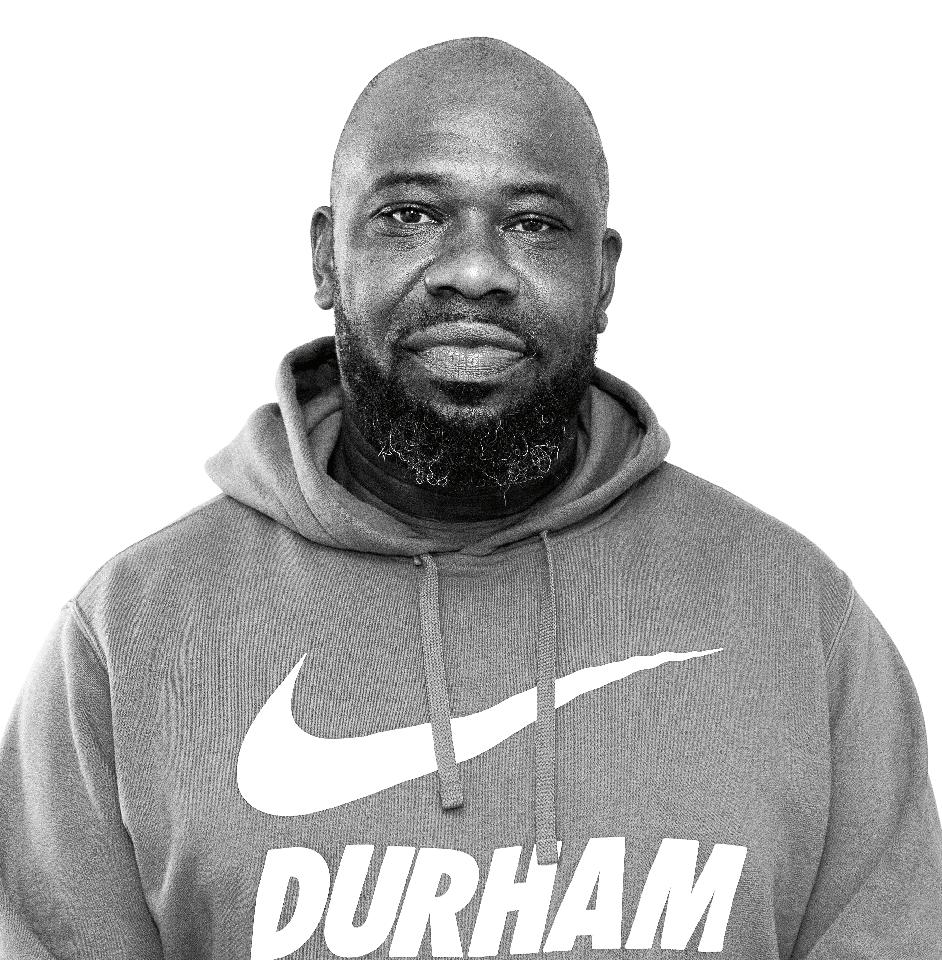
to the parking lot and had a discussion for several hours. What came from that discussion was what we now know as Little Brother.
Producer | Durham
If you notice, all the OG rappers from the ’90s and earlier have moved to North Carolina. We got Big Daddy Kane, Special Ed, Mike Gee from Jungle Brothers, and Sadat X.
One of my most favorite recent hip-hop moments is definitely Gene Brown’s beat battle, “The Gene Brown Beat Down,” with Nottz and Bink! That night was electric! I did a beat battle back in like 2003–2004, and I wanna say J. Cole was in the crowd that night and he challenged 9th
As hip-hop turns 50, icons from across the state reflect on how the genre took shape in North Carolina—and changed everything.Jozeemo PHOTO BY BRETT VILLENA


[Wonder] in the parking lot. That’s some wild shit to look back on because he wasn’t even J. Cole back then, he was Therapist. I have so many great moments!
Being a part of The Justus League—we were doing shows at a lot of the local venues such as Local 506, the Hideaway, Cat’s Cradle when they had the video store next to it, and the Brewery. A lot of these venues are gone now.
Shout-out to Mike Nice, Courtney C., DJ Bro Rabb, and the whole Butta Team, because they had the crazy college radio show at North Carolina Central on Saturdays called Straight from tha Crate. Shout-out to DJ Samps, because he had a radio show at Duke on Fridays. Shout-out to DJ Resident, he had the show at NC State. College radio was super heavy in the early 2000s in North Carolina. That was where I was getting a lot of my underground stuff from. I heard “Tru Master” by Pete Rock for the first time from Bro Rabb. That was a moment for me to stop everything I was doing to try to figure out what that was.
BRO RABB (The World Famous Butta Team)
DJ | DurhamSweet Emma’s was a record store that my dad used to take me to right off of University Drive. Back in the midto-late ’80s, it was a record store that looked like a house and you would walk in there and there were all these used records. By the time Sweet Emma’s closed, the Old Man Record Shop was going, we also had the Record Rack in Forest Hills, and another commercial record bar in South
Square Mall [Camelot Music].
There was a Butta Team before I even got involved, but The Butta Team that really made a difference was myself, Skaz Digga, Mike Nice, DJ Mad, Courtney C., DJ LiL B. We were a collection of DJs, producers, we had accounts with record labels where we would go out and work the records for certain labels—we were one big self-contained unit of everything. We did the radio. Mike Nice and DJ Mad had a radio show at Duke in ’93, and then in ’96 Mike Nice started hosting Straight from tha Crate at WNCU and I joined him in ’97. For a number of years we hosted a rap battle called “Duel of the Iron Mic” named after the GZA song; we did parties and the Welcome to Durham documentary.
I’ve been professionally touring with Kidd and Play since 2016, they have taken me all around the world, and Skaz has been Big Daddy Kane’s DJ at least since 1999.

The first time I saw a group from North Carolina in the source was ’95. Bomm Sheltuh is a group from Fayetteville made up of Nervous Reck and FilthE Ritch. When I was really on my shit, I put out my first album and would drive city to city on some Master P shit. It was nothing to see me pull up in the Honda and pop the trunk and have like 1,000 CDs. I did that in every city. Fayetteville, when I got there, I developed a relationship with a Nerve [Nervous Reck] of Bomm Sheltuh. Then they started coming to Microphone
Monday and would bring a 16-year-old light-skinned kid named Therapist. Nerve used to be like, “Ay Kaz, I got my man with me. He too young to be in here.” I was always like, “Nah, y’all good. Just come around. Just you know, long as he not drinking, we good.” Of course, Therapist is now known as J. Cole today and one of the biggest artists to represent North Carolina.
Rapper/DJ | Virginia/Durham
My earliest memory of hip-hop in North Carolina is 1998, when I came down to school for college. Hearing all of the different regions and styles and it was all infused into one. I’m from Virginia, the DMV area, so it was either go-go or New York rap, for the most part. So coming down to North Carolina and really getting a melting pot of hiphop was refreshing.
2000–2001 was a moment in time for North Carolina. The underground hip-hop scene was thriving, as there were a number of venues to perform at. There was the Hideaway in Chapel Hill, Local 506, Cat’s Cradle. The scene, which was still kind of new, was filled with a bunch of hungry talented people that wanted to show that North Carolina not only had something to say, but that North Carolina wasn’t what people thought or perceived Southern hiphop to be. Everybody supported each other, and it was a great, great time.
In the late ’90s I saw Sankofa and Tyfu at Cat’s Cradle. They were the first NC-based hip-hop groups I saw live. North Carolina hip-hop is undefinable. There’s too many different styles and variations to put a pin on it. North Carolina pulls influence from all over. I have a ton of favorite hip-hop-related memories. If I had to pick one, I’d say it was opening for Little Brother at Hopscotch in 2019—what a great moment in time!
My favorite memory related to hip-hop in North Carolina is when Little Brother reunited at the Art of Cool Festival in 2018. For many years, we heard from Phonte, 9th Wonder, and Pooh that the group was never getting together again. I’ve been a huge Little Brother fan since 2001, and the first time I ever saw them perform was that year at the Cabaret—a “club” that was in the basement of UNC-Chapel Hill’s old student union. From that point on, I was a fan. It was so exciting to see them together again at the 2018 Art of Cool Festival. The performance was so energetic, and the moment brought back so many great memories. I was so excited I literally broke out in goose bumps!
My greatest contribution to North Carolina hip-hop, first and foremost, is being a fan of the culture. Second is the work I did with www.nancioishiphop.com (site remains active as an archive) and my YouTube channel from 2008 to 2018 to document North Carolina hip-

















































































































hop. It brought me a lot of joy to the point where it didn’t feel like work. I have a lot of great memories and positive experiences. I loved going to live shows, other events, interviewing artists, meeting people, talking about the culture (offline and online) and so much more.
Around 2017, a student archivist from UNC-Chapel Hill Wilson Library’s Southern Historical Collection reached out. He conducted an extensive interview about my blog, radio show, etc., to archive in the library as part of North Carolina’s hip-hop history. Up until that point I didn’t even realize the work I was doing would create space for a historic opportunity like that. At the end of it all, I was just having fun, trying to be positive, encouraging, and sharing what I learned about North Carolina hip-hop through the blog and radio show. I keep the site active as an archive as a testament to the extensive and momentous impact North Carolina artists, personalities, music, producers, other content creators, etc. I have contributed to hip-hop culture around the world. Hip-hop may not have been born in North Carolina, but it most certainly lives here—in the past, present, and future.
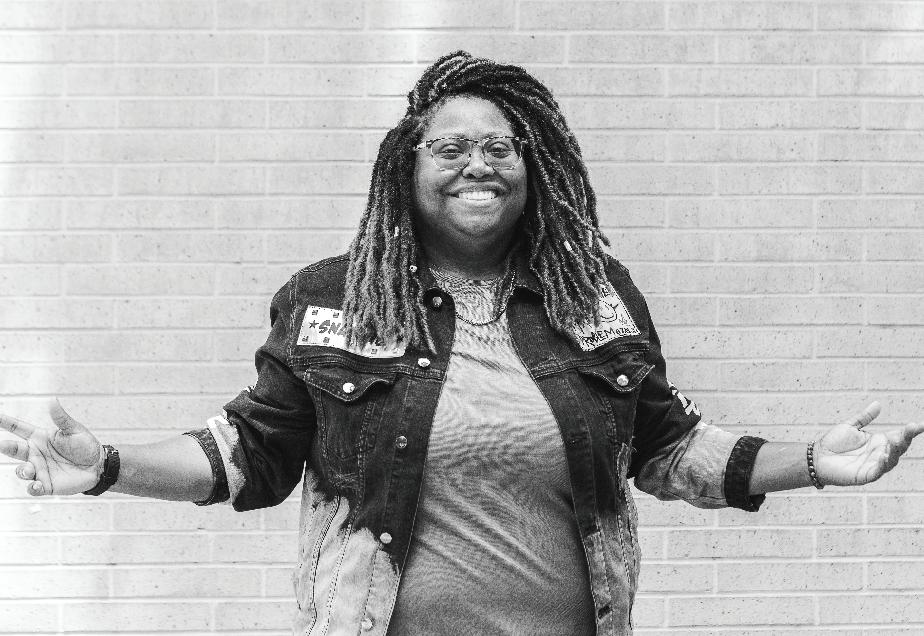
Rapper/DJ | New York City/Durham
My favorite memory related to hip-hop in North Carolina was having legendary artists like Boot Camp Clik, Jean Grae, and Murs, just to name a few, fly down here to work with everyone in my crew, The Justus League. Those recording sessions will live in my mind forever.
Rapper/Singer/Songwriter/Producer | Red Springs
Shout-out to The Butta Team! They used to host these rap battles called “Duel of the Iron Mic” at the Durham Armory. The first year, I lost in a round to a guy from Durham named Omotade. He went on to battle Joshua Gunn, who was a teenager, damn near a child prodigy, won the entire competition. I never lost a battle after that!
North Carolina has always been a bridge for hip-hop. We’re literally in the middle. We are the South, but we’re not Deep South. Like, we’re not Louisiana. We’re not Florida. Growing up here, there was always a melting pot of different sounds heard because of the number of transplants, the surrounding colleges and universities, and up north drug dealers moving up and down I-95. We have always offered a little bit of everything, and of course, there’s a heavy East Coast influence, but also there is definitely Southern influence because the style of life here is very much Southern and very laid back. It’s really not surprising when I see so many OG rappers like Big Daddy Kane and Sadat X from Brand Nubian have moved here.
Me and all of my brothers that I came up with doing this with, I think, were the example of how to make it from North Carolina without having to leave North Carolina. I’ve been blessed enough to see the world, but none of those places ever compared to home. I’ve always considered North Carolina to be an additional group member of Little Brother.
JOSHUA GUNN Rapper | DurhamI remember being in like fifth and sixth grade, and I would call into the radio late-night to rhyme on the air. This was back when being on the radio was a big deal, and anytime you were on the radio, you felt like “you made it.” Then we started finding out about college radio, WXDU at Duke, led by DJ Samps and Big Dho, and WNCU had a show with DJ Bro Rabb and Mike Nice called Straight from tha Crate. These were spots where you could actually go up to the radio and rhyme. It made us feel like legit superstars, because everybody listened to the radio back then. I used to call in and spit my rhymes, and the
DJs would go crazy—that’s really how I started to take my craft seriously, and also how I got exposed to all the other dope emcees in North Carolina. Hip-hop radio was so vital to the culture back then—it probably sounds crazy to say in today’s context where most people don’t really tap in with radio unless it’s to hear a mainstream artist, but the radio really helped us build our scene, especially in the Triangle.
My favorite hip-hop memory is actually an entire era. I was in high school (the early 2000s) and we had a crazy movement of talent happening in the Triangle. Although we were all competing with each other, there was also a spirit of cooperation. We had movements like Tyfu, Kaze, The Justus League, K.Hill, M.O.S., Jozeemo, so many dope emcees, producers, and groups, all really cultivating their own sound with legitimate followings. This was back when the national hip-hop scene wasn’t paying North Carolina any attention, so we had to build our own scene.
I was also heavy into the battle scene, and had some dope battles against folks like Phonte, Jozeemo, Kaze, and so many others; we really were living the culture back then, and being the best emcee was the only thing that mattered. That was the greatest period in the history of North Carolina hip-hop … you just had to be there.
My earliest memory of hip-hop in North Carolina is Microphone Mondays at Local 506 run by Kaze and Deon. This was the first spot where local talent or underground talent would come and get a chance to get their bars off. Microphone Mondays was the biggest
“I’ve always considered North Carolina to be an additional group member of Little Brother.”
local show around. People would come all the way from Raleigh, Durham, Greensboro, and Fayetteville just to come to Chapel Hill to rock.
I don’t feel like North Carolina hip-hop has a style or identity—there is no North Carolina sound. We’re East Coast and we’re Southern. You get the best of both worlds here. When I think about my greatest contribution to North Carolina hip-hop, I was like that organic guy before social media. You know, before everybody had smartphones. I was showing up to venues with 75 people. I was even selling out venues before I really got noticed. I had a real organic following that grew from word of mouth.
I actually met Kurtis Blow when he was performing at the Durham Armory. My dad had a hair salon that was around the corner, and there were all these flyers about Kurtis Blow coming to town. I walked around the corner, and at the time, unbeknownst to me, I caught Kurtis Blow walking in for what was to be a sound check. I had no idea what a sound check was back then. I ended up talking to him, and he gave me two tickets. Years later, I had a chance to catch up with him in a recording studio. He was doing a record with DJ Nabs and I had an opportunity to talk to him and thank him. His kindness at that time meant a lot to me. He was one of the biggest artists out and The Breaks was a historic record. I’ve never forgotten that moment.

I’ve been the DJ, manager, driver, booking agent—you name it. I helped start The Justus League and the Hall of Justus production company. The Justus League was just making music. Once you make music you have to do something with it. So my thing was to get out and try to do more. In addition to managing The Justus League as a collective, I have also managed individual members. The same for Little Brother. I’ve managed the group as a collective and have also managed individual members. Managing 9th took me to some places that LB didn’t get to. You know, getting the call about the Mary J. Blige album, getting the paperwork done for Jay-Z, going to meet with Mariah Carey. Right now I’m working with Lute, who is signed to Dreamville. I know we—The Justus League or Little Brother—didn’t get a chance to go platinum, but we definitely paved the way and showed other artists that their success didn’t rely on radio or support from home.
President of Jamla Records | Rocky Mount
My best friends that I grew up with, Brandon and Brian, introduced me to The Justus League. My brother was already listening to them, but he was in college so I wasn’t getting it direct from him. I was getting it from, you know, the guys I was going to high school with. Once I said something to my brother about them he was like, “Oh yeah. I
know Phonte, and me and 9th used to hoop together at State.” And I’m like, “Oh, shit, so you know these dudes.” My brother knowing them made it even better, because the music was just so phenomenal. It was kind of hard to imagine that they were just, you know, regular Joes.
I have a number of favorite North Carolina hip-hop moments, but Rapsody performing at the DPAC during the Art of Cool Festival was such a dope moment. It was her and Common on that show. At that time, she was working on a Netflix documentary and the camera crew was there. It was just a really dope moment. When Little Brother had their reunion at Art of Cool a few years back, that was also a dope moment.
In 2015 I was working at K97.5; we got a new program director and he wanted us to be more involved in the local scene, and the first event that was coming up was the DURM Hip Hop Summit. I volunteered to host it, despite never hosting an event before. That was the first time I had ever been to a local hip-hop event. I met Well$, G Yamazawa, Deniro Ferrar—it was also the first time I saw Will Wildfire perform. There were just so many dope artists and I was inspired. My program director wanted to bring back a local show called 919 Radio and I volunteered to host it. When it relaunched in 2016, the show became really popular. I had also started doing small shows for local artists so I decided to rebrand it under one title so it can be an overall platform and entity that does multiple things. Carolina Waves is now the biggest and most consistent touring platform in North Carolina.
Rapper | Greensboro
One of my earliest memories of hip-hop in North Carolina was my mom [Sandra Thompson] opening a show. KRS-One was one of the headliners, and I got to shake his hand. North Carolina has a huge musical history, and it’s a hotbed of hiphop talent—Little Brother with Phonte and Pooh, Jamla with 9th Wonder, Rapsody, and Reuben Vincent. Dreamville with J. Cole and Lute. Can’t forget about DaBaby and Mez—just so many talented people here. When I think about my greatest contribution to North Carolina hip-hop: Kooley High has supported the local scene in Raleigh more than just about anyone. Since we started H2O [a student-run hip-hop organization] in college, we never stopped representing our town to the fullest. That’s almost 20 years of classic albums, soldout shows, and dope parties.
DJ | Cary
My earliest memory of hip-hop in North Carolina is when I went to go see the X-Ecutioners perform at the Cat’s Cradle in 2002. This group I had never heard of before was opening up for them and they killed it! At the end of their set Phonte said, “Yo, our debut album The Listening is dropping soon.” The rest is history. W
MUSIC
AJJ $23. 8 p.m. Cat’s Cradle, Carrboro.
Decrepit Birth / Psycroptic $20. 7 p.m. Local 506, Chapel Hill.
With Love $10. 8 p.m. Cat’s Cradle Back Room, Carrboro.
Best of the Triangle Comedy Show 8 p.m. The Durham Hotel, Durham.
Paperhand Puppet Intervention: Where Our Spirits Reside $10+. Aug. 4–Sept. 17, various times. Forest Theatre, Chapel Hill.
Wicked $56+. Aug. 23–Sept. 17, various times. DPAC, Durham.
MUSIC
Almost Sober $10. 8 p.m. Local 506, Chapel Hill.
Bowbarr Patio Fundraiser Project with Dynamite Brothers, Kerbloki, Toothsome, and The Paul Swest $20. 8 p.m. Cat’s Cradle Back Room, Carrboro.
DJ KJB on the Rooftop Aug. 24-25, various times. Tin Roof, Raleigh.
The Great Reset 10 p.m. Tin Roof, Raleigh.
Joshua Kendrick 6:30 p.m. Tin Roof, Raleigh.
Live Jazz with Marc Puricelli and Friends Thursdays at 7 p.m. Imbibe, Chapel Hill.
Nerd-Vana Burlesque
Presents: Boobs over Broadway $10. 7:30 p.m. Ruby Deluxe, Raleigh.
Zero-Proof: A Sober Drag Show! $15. 9 p.m. The Pinhook, Durham.
Dr. Caligari 7:30 p.m. Shadowbox Studio, Durham.
The Elephant 6 Recording Co.: Screening and Postfilm Discussion with Scott Spillane 7 p.m. Motorco Music Hall, Durham.
Flashback Flicks Outdoor Movie Series: Roman Holiday 8 p.m. JB Duke Hotel, Durham.
MUSIC
Alfred Banks / Lena Jackson $12. 9 p.m. The Pinhook, Durham.
Andrea Vasquez: Nashville Hits the Roof! 8 p.m. Tin Roof, Raleigh.
Ben Nichols Bikeriders
Tour $20. 8 p.m. Cat’s Cradle, Carrboro.
Briscoe $15. 8 p.m. Cat’s Cradle Back Room, Carrboro.
Bronco: En Vivo y a Todo Color $78+. 8 p.m. Martin Marietta Center for the Performing Arts, Raleigh.

Level Up $25. 9:30 p.m. Lincoln Theatre, Raleigh.
LFG Fest $30+. Aug. 25-26, various times. Motorco Music Hall, Durham.
Stranger Boy 10 p.m. Tin Roof, Raleigh.
Third Annual Choreographers Spotlight in Partnership with Carolina Ballet $15. 7:45 p.m. NCMA, Raleigh.
3 Doors Down: Away from the Sun Anniversary Tour $57+. 8 p.m. Red Hat Amphitheater, Raleigh.
Be Loud! ’23 with The Maxell 90 and Preeesh!
$25. 8 p.m. Cat’s Cradle, Carrboro.
Crones of Anarchy 7 p.m. Succotash, Durham.
Dave Halston: The Sinatra Experience $86+. 3 and 7:30 p.m. Martin Marietta Center for the Performing Arts, Raleigh.
Dexter Moses Quartet
$25. 8 p.m. Sharp 9 Gallery, Durham.
DJ Laz on the Rooftop 10 p.m. Tin Roof, Raleigh.
Eddie Bustamante 10 p.m. Tin Roof, Raleigh.
Liam St. John $18. 7 p.m. Local 506, Chapel Hill.
Little Image $16. 8 p.m. Cat’s Cradle Back Room, Carrboro.
Maple Stave $10. 7:30 p.m. The Pinhook, Durham.
Sterling Scott 3 p.m. Tin Roof, Raleigh.
Tommy Niemann Band
6:30 p.m. Tin Roof, Raleigh.
Wyatt Flores SOLD OUT. 8 p.m. Lincoln Theatre, Raleigh.
The ComedyWorx Show Matinee $9. Saturdays at 4 p.m. ComedyWorx, Raleigh.
SCREEN
Outdoor Film Series: In the Heights $7. 8:30 p.m. NCMA, Raleigh.
“Give the Drummer Some” Benefit Concert for NCCU Jazz Studies Program $40. 6 p.m. Sharp 9 Gallery, Durham.
Lo / Cadaver Delende / 11 to Midnight / SmkBrk $10. 7 p.m. Local 506, Chapel Hill. Money Shot / Ghost Rattle 6 p.m. The Night Rider, Raleigh.
Shakti: 50th Anniversary Tour $50+. 7:30 p.m. Koka Booth Amphitheatre, Cary.
Sights and Sounds Concert Series: Ieva Jokubaviciute and Itamar Zorman $17. 2 p.m. NCMA, Raleigh.
Summer Dance Party with Duck, Elora Dash, and Dolphin Group $10. 8 p.m. Cat’s Cradle Back Room, Carrboro.
Los Amantes Perfectos $45+. 8 p.m. Martin Marietta Center for the Performing Arts, Raleigh.
Songs and Stories in Celebration of the Life of Caleb Southern $15. 7 p.m. Cat’s Cradle, Carrboro.

Jeremy “Bean” Clemons
Trio $8. Tuesdays at 9 p.m. Kingfisher, Durham.
Mystery Skulls $18. 8 p.m. Motorco Music Hall, Durham.
North Carolina Jazz Repertory Orchestra Concert $25. 8 p.m. Sharp 9 Gallery, Durham.
Rob Zombie and Alice Cooper: Freaks on Parade
Tour $24+. 6 p.m. Coastal Credit Union Music Park, Raleigh.
5:30
Elijah Rosario: Discovery after Death Tour $13. 7 p.m. Lincoln Theatre, Raleigh.
Lady Lamb SOLD OUT. 7 p.m. The Fruit, Durham.
Paige King Johnson $10. 5:45 p.m. Koka Booth Amphitheatre, Cary.
The Thing $13. 8 p.m. Cat’s Cradle Back Room, Carrboro.
Lauren Sacks and Alexandra DeSiato: Whole Mama Yoga 5:30 p.m. Flyleaf Books, Chapel Hill.
Below Decks: FemiTheFemme, DJ Shahzad, and LXC 8 p.m. The Fruit, Durham.
Cian Pedersen 10 p.m. Tin Roof, Raleigh.
DJ KJB on the Rooftop Aug. 31–Sept. 1, various times. Tin Roof, Raleigh.
Live Jazz with Marc Puricelli and Friends Thursdays at 7 p.m. Imbibe, Chapel Hill.
Tyler Nail / Elizabeth Mar $15. 7 p.m. The Eno House, Hillsborough.
Zachary Wynne 6:30 p.m. Tin Roof, Raleigh.
Flashback Flicks Outdoor Movie Series: Raiders of the Lost Ark 8 p.m. Washington Duke Inn & Golf Club, Durham.
Kelley Shinn: The Wounds That Bind Us 5:30 p.m. Flyleaf Books, Chapel Hill.
Intocable: Evolucion Tour $82+. 8 p.m. Martin Marietta Center for the Performing Arts, Raleigh.
Fall in tha Carolinas feat. DC the Don, BIGBABYGUCCI, and More $30. 9 p.m. Lincoln Theatre, Raleigh.
Gladys Knight $125. 7:30 p.m. NCMA, Raleigh.
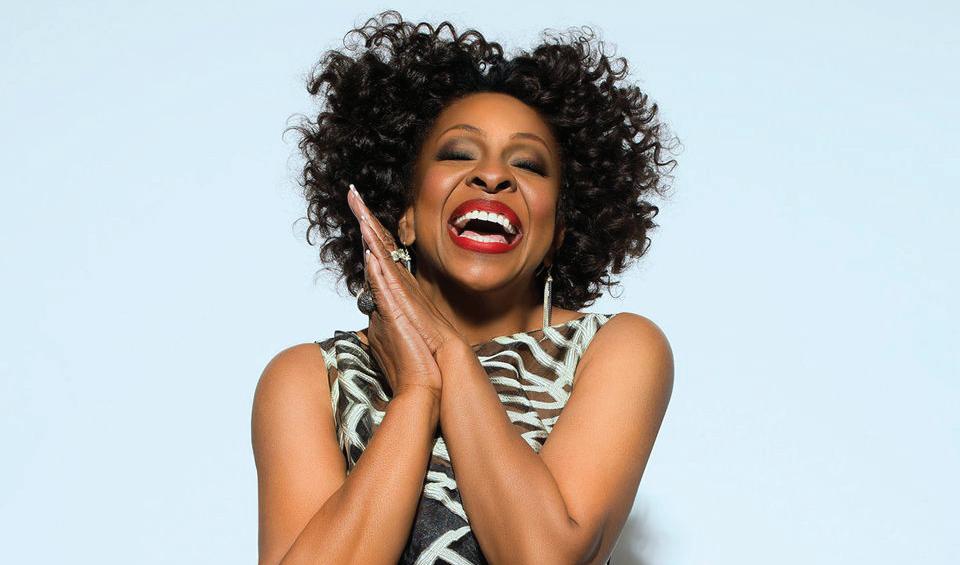
Jake Haldenvang 6:30 p.m. Tin Roof, Raleigh.
Jim Ketch Swingtet $25. 8 p.m. Sharp 9 Gallery, Durham.
PLAYlist Concert Series: Queen Esther 7:30 p.m. Durham Central Park, Durham.
Strange Ranger $15. 7 p.m. The Pinhook, Durham.
Up in the Clouds: Rashaad King, DJ Yung Yankee, Dap YP, Bianca Jade, and Kayosity $10. 8 p.m. Local 506, Chapel Hill.
Zach Westcott Sept. 1-2, 10 p.m. Tin Roof, Raleigh.
EGO FEST: Three Films So “Bad” They Are Essential $5. 7 p.m. The Fruit, Durham.
First Friday Outdoor Movie Night: Back to the Future 6:30 p.m. Moore Square, Raleigh.
MUSIC
Anita O’Day’s “Cool Heat” with Brad Linde Ensemble $25. 8 p.m. Sharp 9 Gallery, Durham.
Hipnotized feat. DJ Skillz and Freeway $30. 9:30 p.m. Lincoln Theatre, Raleigh.
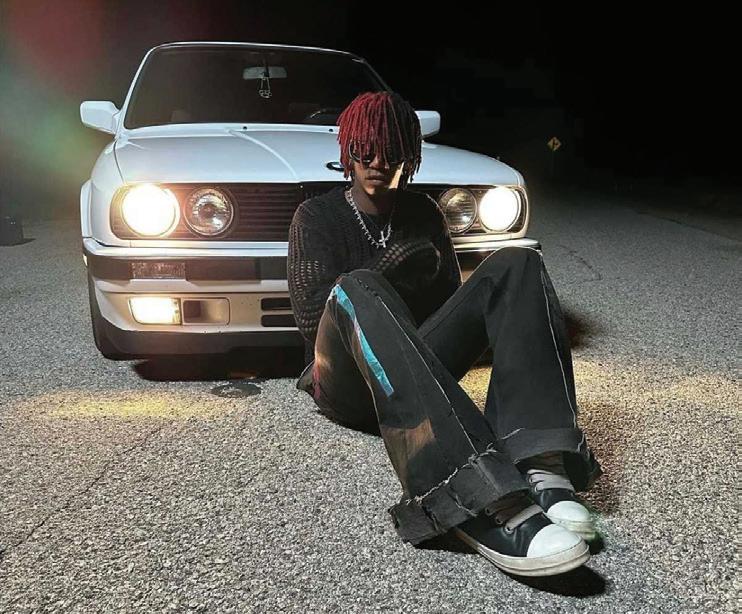
Kinetic Audio Presents: ABYSS $15. 9:30 p.m. The Fruit, Durham.
Real Rowdy 6:30 p.m. Tin Roof, Raleigh.
Taylor Swift Laser Dance Party $15. 8 p.m. Cat’s Cradle, Carrboro.
William Nesmith 3 p.m. Tin Roof, Raleigh.
The ComedyWorx Show
Matinee $9. Saturdays at 4 p.m. ComedyWorx, Raleigh.
Dancing through the Decades: A Pole Arts
Showcase $15. 6:30 p.m. The Pinhook, Durham.
Formosa Melody Music Center: Modern Taiwanese Folk Music and Dance
$20. 7 p.m. Martin Marietta Center for the Performing Arts, Raleigh.
5 Seconds of Summer: North American Tour 2023 $74+. 7 p.m. Red Hat Amphitheatre, Raleigh.
Concerts in the Park: SNAP 5 p.m. E. Carroll Joyner Park, Wake Forest.
Duke Symphony Orchestra Pops Concert 6 p.m. Duke East Campus Main Quad, Durham.
Jaguar Sun $16. 8 p.m. Cat’s Cradle Back Room, Carrboro.
Mallarme Music Series
Concert: VIOLAPALOOZA
$10+. 3 p.m. Nelson Music Room, Durham.
Smooth Nights with Jonathan Butler, Rick Braun, and Richard Elliot $41+. 7 p.m. Koka Booth Amphitheatre, Cary.
Black Tusk $15. 8 p.m. Local 506, Chapel Hill.
Jeremy “Bean” Clemons Trio $8. Tuesdays at 9 p.m. Kingfisher, Durham.
The Tallest Man on Earth $33. 8 p.m. The Carolina Theatre, Durham.
Queer Movie Night 3000: Hedwig and the Angry Inch 7 p.m. The Pinhook, Durham.
Anise Vance: Hush Harbor 5:30 p.m. Flyleaf Books, Chapel Hill.
Brittney Hanks: Costco One Stop Meals 12 p.m. Quail Ridge Books, Raleigh. Etaf Rum: Evil Eye 7 p.m. Quail Ridge Books, Raleigh.
Nicolette Cagle: Saving Snakes 5:30 p.m. Sarah P. Duke Gardens, Durham.
If you just can’t wait, check out the current week’s answer key at www.indyweek.com, and click “puzzle pages” at the bottom of our webpage.
this week’s puzzle level:

There is really only one rule to Sudoku: Fill in the game board so that the numbers 1 through 9 occur exactly once in each row, column, and 3x3 box. The numbers can appear in any order and diagonals are not considered. Your initial game board will consist of several numbers that are already placed. Those numbers cannot be changed. Your goal is to fill in the empty squares following the simple rule above.

If you just can’t wait, check out the current week’s answer key and previous puzzles at indyweek.com/puzzles-page

Best of luck, and have fun!

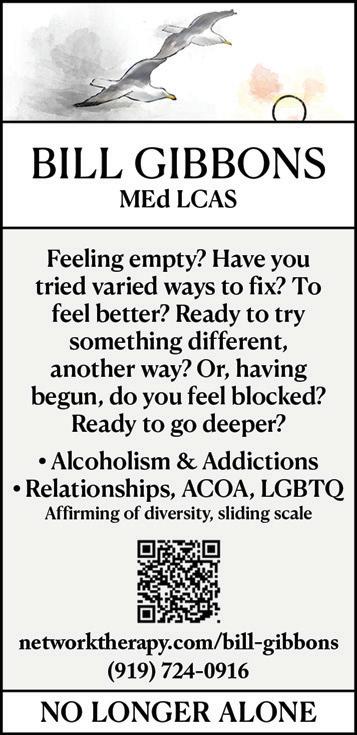
Data Engineer
Data Engineer @ Enact Mortgage Insurance Corporation
(Raleigh, NC) F/T Prvde detailed tchncl dsgn, dvlpmnt, & implmntatn of state of the art, next generatn Big Data sftwr applctns using emergng tchnlgy pltfrms. Reqr Bachlr’s degr, or frgn eqvlnt, in Comptr Sci, Informtn Technlgy, or rltd field, & 3 yrs of exp in the job offrd, as Data Prdct Test Engnr, Prgrm Analyst, or rltd positn invlvng data warehsng/ engnrng. Altrntvly, emplyr will accpt Mastr’s degr & 1 yr of exp. Full trm of exp must incld each of the fllwng: Data warehsng or data engnrng; Open Source prgrmmng langgs for data analysis, incldng SQL & Python; Java dvlpmnt for data engnrng; Data modelng dvlpmnt; Wrkng w/ cloud data capablities; &, Python, Scala, or R for large scale data analysis. Emplyr will accpt any suitble combo of eductn, trainng, or exp. Remote wrk permttd. Email resume to ImmigrationServices@genworth.com. Refrnce: EMIC-SK.


Senior Software Engineer

Senior Software Engineer sought by LexisNexis USA in Raleigh, NC to perform research, design, software development assignments within specific software functional area or product line. Minimum of Master’s degree or foreign equiv in Computer Science, Computer Engineering, or rltd + 3 yrs exp in job offered or rltd occupations required. EE reports to LexisNexis USA office in Raleigh, NC but may telecommute from any location within US. Interested candidates apply by mail to T. Hayward, RELX Inc; 1000 Alderman Dr, Alpharetta, GA 30005. Ref job code: 01085
Software Engineer
Software Engineer, Veradigm LLC fka Allscripts Healthcare, LLC. May teleco in US & rept to Raleigh NC offce. Perfm dsgn, code, test, doc in hlthcare SW dev & maint. Reqs Bach in CS, MIS / rel / equiv & 2 yrs SW engg exp incl 2 yrs: mentor & guide team membrs; C#; MS SQL Srvr; SW dsgn pattrns. M - F 8a - 5p. Apply: resume to applicants@ veradigm.com & ref job #111360
Groovewagon has a wholeass tent at Hopscotch! maybe come kick it and learn why you should consider drinking weed and ditching booze?
919-306-8598 SOCIALS ARE FOR SUCKERS, JUST TEXT US!
Your
Alt exclusively at AltFriendly scenes like Ruby Deluxe (DTR), State-of-Beer (DTR), and RoShamBo (DTR)
already know you want to try the Cali-Sober Lifestyle (hawt) and just score from us directly? text us, or go to www.thatdamnwagon.com and we’ll make arrangements ASAP. no influencers, no fuss, pure party.
Reilly can’t play a lick, but it’s always been cool as hell that real talented folks like Kenny and MikeRo and BDC and Nathan and ZOden and etc etc so on so forth have always been kind to their fans. Raleigh needs your heart!!!
